#she also read us some chinese poetry and short stories
Explore tagged Tumblr posts
Text
After 7 years on my job, I'm finally on my first educational leave (Bildungsurlaub) this week! Most of my colleagues do it every year, but I couldn't until now because I only had fixed-term contracts. Now it's finally my turn to get fully paid for a whole week while learning a couple of relaxtion techniques and sipping tea 😊
#today we did some Qi Gong and a Body Scan#she also read us some chinese poetry and short stories#next year I'll do pottery <3
4 notes
·
View notes
Text
For those who aren’t quite over An Ancient Love Song – the story from Lu Yuan’s perspective
Hello all! This will be a translation of two videos by Bilibili creator 小城问路家 that I found to be exquisite character analyses. I considered subtitling them, but I don’t want to rip the videos from his platform and I think they still work effectively in essay form. If you understand Chinese/have a Bilibili account, I highly recommend giving these videos some support:
Part 1 | Part 2
Below begins the full translation. FYI, I’ll be editing content where necessary to make this read better. I also recommend having a snack and some water at the ready because this is going to be quite lengthy.
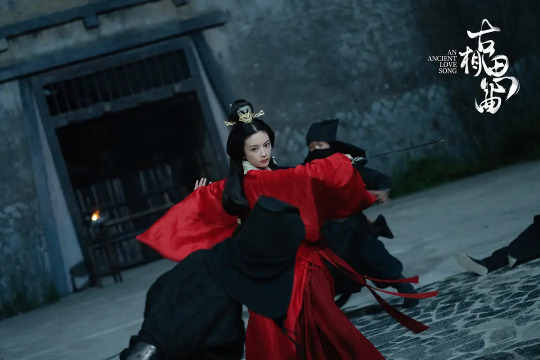
Viewers are all aware that this drama is presented from Shen Buyan’s perspective. From his point of view, the instances in which he travels back are separated by a very short period of time. Between some leaps, there isn’t any separation at all. What that means is that his and Lu Yuan’s situations are drastically different.
When it comes to Lu Yuan, there are large periods of “empty” time in between Shen Buyan’s time leaps. Three years, five years, ten years, and then the rest of her life. Likely, the production team became aware of this problem and created a special episode that retells the story from elderly Lu Yuan’s perspective. But perhaps due to financial and time length restrictions, this special episode more so uses material from the full drama and plays it in reverse while incorporating elderly Lu Yuan’s narration in key moments.
What viewers should understand is that that episode is told from elderly Lu Yuan’s perspective, who has access to an omniscient point of view. She already knows about this entire story.
Meanwhile, what I think really appeals to us as viewers about this story are those long periods of waiting. During those three, five, ten years that Lu Yuan spends waiting, her understanding of the story isn’t actually complete. We can’t use an omniscient perspective to understand Lu Yuan. She only experiences small bits at a time, and she also refuses Shen Buyan’s attempts to reveal more details to her. When I rewatched the show from Lu Yuan’s perspective and ignored omniscient knowledge, I discovered all the little details that the director and writers slipped into the show.
Jing Ping Year 30: Lu Yuan, 18 years old
Let’s start from when Shen Buyan traveled to when Lu Yuan was 18 years old. At this time, Shen Buyan is carrying the regret of not fulfilling his promise to stay with her. He has come back in a very frail condition and encounters Lu Yuan. Then the following exchange occurs between Lu Yuan and Shen Buyan—remember this scene, as it will become relevant later:
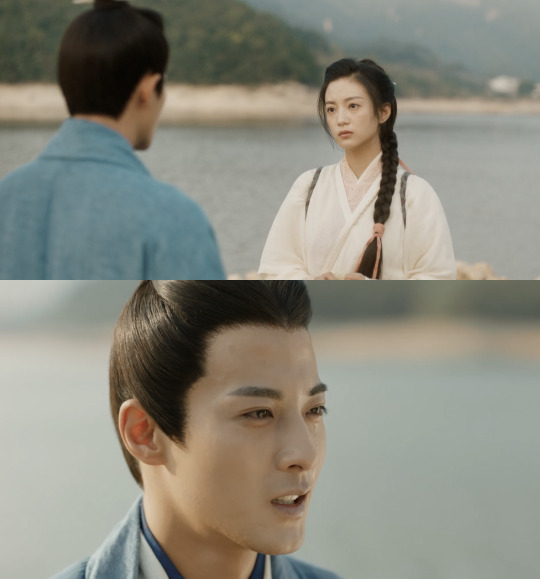
LY: You recognize me? What is the matter? Why are you crying? SBY: Someone’s waiting for me. But I went the wrong way.
18-year-old Lu Yuan sings the following lines of poetry as she returns home. These lines also appear in prior parts of the plot:
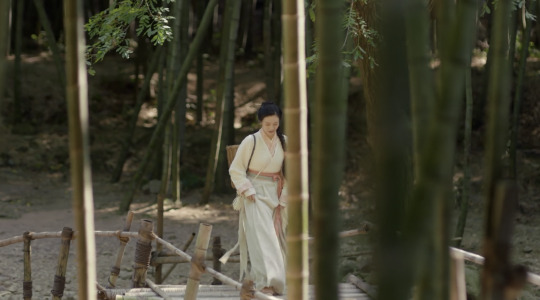
At first, when we set out, The willows were fresh and green; Now, when we shall be returning, The snow will be falling in clouds.
Translation from the Chinese Text Initiative of the University of Virginia
This poem comes from the Classic of Poetry's "Caiwei," which tells the story of a soldier who is enlisted into battle at a faraway border. In the endlessly long years of war, he expresses longing for his family. These lines discreetly touch on the drama's three main themes: the cruelty of war, longing for your beloved, and prolonged periods of waiting.
Shen Buyan first decides to keep his distance from Lu Yuan. But when he discovers that she's being mistreated, he still reveals himself to pass knowledge on to Lu Yuan.
Some of his teachings are more obvious foreshadowing, like hiding secret codes in music or when he teaches her things about the nations that are beyond the time period's understanding—even though it isn't explicitly said, we can still guess that in addition to geography, he teaches her all about economic and military matters. Hence, he gives her what she will need to become the mother of the emperor who will unify the nine nations.
Aside from that, the first lesson that he teaches her is to "understand larger truths from smaller signs." When we first watch, we might see this teaching is foreshadowing for when Lu Yuan later takes down the husbandry official—it's through this lesson that she discovers the official is secretly selling military horses to Beilie.
But I think the lesson is mainly a prelude for the rest of the drama. When people talk about this show, they all say that Lu Yuan is a wise and intelligent female lead. I think that everything started with this lesson of "understanding larger truths from smaller signs," because it explains how later—be it with Shen Buyan's time travel or her battles with Li Yong—she's able to understand everything. This includes how, through very small details, she will deduce the truth of the reversed timelines. It's a huge reason why Lu Yuan is able to become the person she is at the very end.
After Shen Buyan finishes teaching her and she defeats the official, Shen Buyan decides to end things and leave. However, Lu Yuan bravely expresses herself and manages to obtain for them a period of time in which the two of them are happily together. But with the start of war, Li Yong sees potential in Lu Yuan and recruits her as a spy to go to Beilie. She says goodbye to Shen Buyan, and ends this first time leap.
In this first leap, I think two details that should be noted are:
Lu Yuan remembers every little thing that Shen Buyan tells her. Specifically, she remembers every little thing from their time together. After a pair of lovers separate and think about each other afterward, aside from looking at physical belongings (like the jade or the konghou), they're likely to spend more time remembering all their tiny interactions with each other. So every detail throughout this first leap is something that Lu Yuan can recall clearly. This is very important to remember for later, when we observe how she changes.
In the three years during which Lu Yuan searches for Shen Buyan, she makes use of the chancellor's connections and resources. In the drama, she says that after completing her mission, she continuously searched for him. During her search for him, she follows Li Yong to Jiangdu. As Li Yong's intelligence director, the information available must be incredibly thorough and it also covers intelligence about all nations. You can assume that she used that intelligence to look for him through an exchange that comes later:
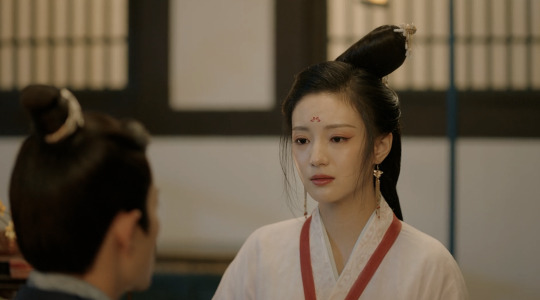
Where have you been all these years? I searched for you for so long. They all said they could not find someone like you. They did not know of you.
We can largely assume that the results of her searches tell her that no such person as "Shen Buyan" ever existed. So in these three years, Lu Yuan must be suspecting whether or not "Shen Buyan" was a real person or who he actually was.
What must Lu Yuan feel as she searches for him? I think we can mainly interpret that at this point, Lu Yuan views him as her first love. If, in this kind of relationship, Shen Buyan never turns up again, we can presume that Lu Yuan would house it away in her heart forever as her first love before moving on to live the rest of her life.
This can be deduced because when Lu Yuan is 18, the difference between this time and her later years is that she doesn't know that Shen Buyan will come back. Plainly, there are no such promises between them. The only thing that exists is the period of time that they spend together. She asks Shen Buyan to wait for her, but when she comes back, she finds that Shen Buyan didn't wait. She wouldn't think that Shen Buyan "disappeared," she would think that he "left." He left without promising to return.
Then, in the following three years, he doesn't contact her at all. So mainly, Lu Yuan would think, He left. Has he forgotten me?
Based on this, you can guess why in her older years, she recalls meeting him again at 21 like this:
Three years later—on the day of the Shangsi Festival—when I thought that everything was simply a beautiful dream from my youth, he suddenly appeared before me once more.
When we think about her in those three years, she must be missing Shen Buyan. But she also wonders whether Shen Buyan has forgotten all about her. If Shen Buyan hadn't returned, she would have preserved him in her memory forever, but she also would have started a new life.
--
Yuanqi Year 1: Lu Yuan, 21 years old
While it's fairly easy to understand Lu Yuan's perspective from when she's 18, it gets much more complicated in the second time leap. Let's first summarize how it goes:
Right when Shen Buyan arrives, he intends to kill Li Yong. After Lu Yuan stops him, the two of them enter into some disagreements. Ultimately, Shen Buyan gives up on his plans before going with Lu Yuan to their home in Nanmeng Lake. They spend some peaceful and happy times together, with Shen Buyan respecting her decisions.
Then he returns with her to persuade the young Emperor against his movements north, and they later witness Li Yong's betrayal and his role in incapacitating the Emperor. Throughout this time, Lu Yuan discovers instances in which Shen Buyan doesn't remember certain things that occurred in their relationship. Afterward, Lu Yuan decides to move to the palace. Shen Buyan fully intends on following her there.
The scene of the rainy night in which he disappears from the carriage is widely recognized as an intensely sad one, but I have a different perspective on it.
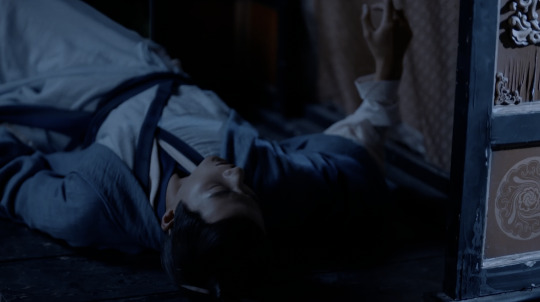
First, let's look at the overall progression of this second time leap. We know that Lu Yuan has discovered the existence of the reversed timelines. When she realizes that Shen Buyan doesn't remember the fruit tree or the jade, she'll then think about the words that Shen Buyan spoke in his sleep before and put everything together. That's when she realizes that they're trapped in reversed timelines.
I do think that she only understands it at surface-level and hasn't yet thought about it in more depth. Like how realization dawns on us as we watch the last episode, she more so only recognizes the foundation of things.
My second thought is based on the first. In the rainy scene of the carriage, why do we all find it to be a very sad scene? One part of it is that Shen Buyan promises to stay with her, but can't follow through. He suddenly disappears without explanation. The second point is that Lu Yuan doesn't know exactly what has become of Shen Buyan, even if she knows that he's disappeared. That she's in pain and turmoil, but she doesn't know how he feels.
We can guess that Lu Yuan overturns these doubts at a later point: when she's in the rain looking for him, she ultimately has to get up on her own and take the carriage herself to the palace. After this, five years pass.
In these five years, she knows much more than she did in the previous three. She knows for sure that Shen Buyan is from the future. She knows with certainty that he had no choice in disappearing. So over the next five years, she will eventually deduce that how they parted from one another when she was 21 was also how they met when she was 18.
She'll think, Why was it that back when I was 18, Shen Buyan was in such awful condition? It was like he had been through hell and back. He was completely frail and kept calling her name.
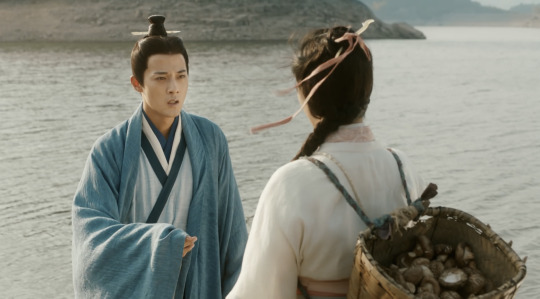
At 18, she couldn't understand why. But after five years, locked in the palace, after spending every night thinking about it, she will eventually figure it out: While I searched for him in the rain, he had not wanted to leave. And when he returned by the river, he was in the same condition that I had been in—no, even worse.
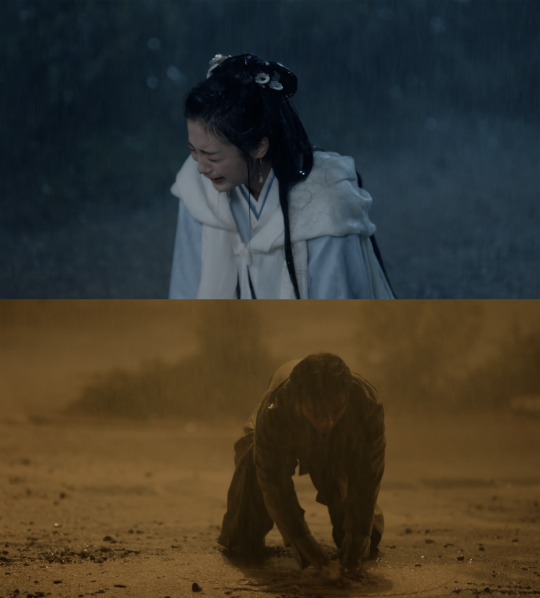
So the reasons for which we deem the rainy scene will be resolved as she thinks everything over. She will realize that he felt just as awful as she did in that moment, and that perhaps he searched for her even more desperately than she did for him. I think after realizing this, Lu Yuan smiled truly, from the bottom of her heart.
In actuality, the director also borrows 18-year-old Lu Yuan in their first meeting to tell Shen Buyan what 21-year-old Lu Yuan wants to say:
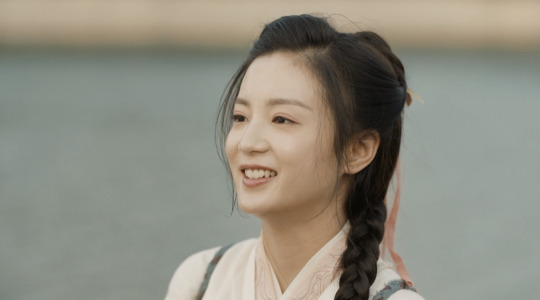
Look at the state you are in. I think that she definitely would not blame you!
My third thought is that over these five years and through her understanding of the reversed timelines, taking into account details from the two times that they met, she will be able to conclude that their very first meeting did not happen in this time leap. Since she didn't recognize Shen Buyan when she was 18, then when Shen Buyan first meets her in the future, he won't recognize her either. Thus, while their relationship is bound to begin at some point in between, it can't be when she's 21. That's because when they first reunite during this time leap, the two of them are clearly already in love with one another—even though Shen Buyan doesn't know about events from when she's 18, he still loves her already in this second time leap.
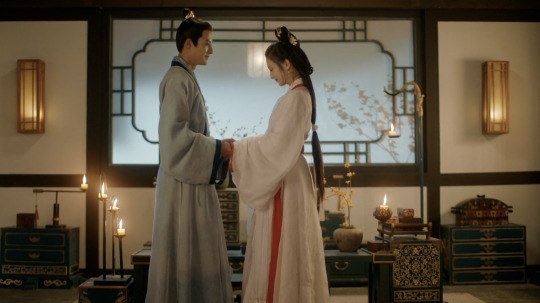
With this, you can tell why Lu Yuan will ultimately stick to this decision:
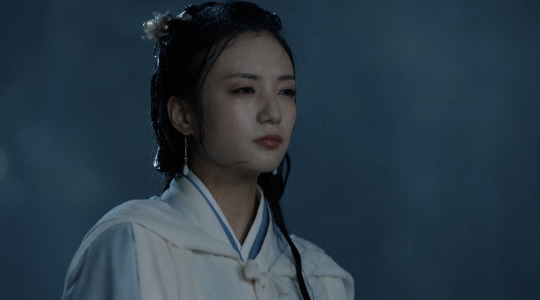
Shen Buyan. If there truly will be a next time, I would rather we not recognize one another.
It's easy to interpret this as her being hurt severely by his departure, but I think the deeper meaning is that when she puts together the puzzle of her meeting Shen Buyan at 18 and 21, this is a decision that will protect Shen Buyan. She's thinking about how to change his fate. Just as Shen Buyan once did to her when she was 18, she wants to leave him, pretend that she doesn't know him so they can avoid their entire relationship from beginning at all. She knows that as soon as it does, they'll end up hurting each other.
This drama is quite symmetrical. Shen Buyan leaving Lu Yuan to protect her and Lu Yuan's decision to do the same after five years' worth of consideration are parallel:
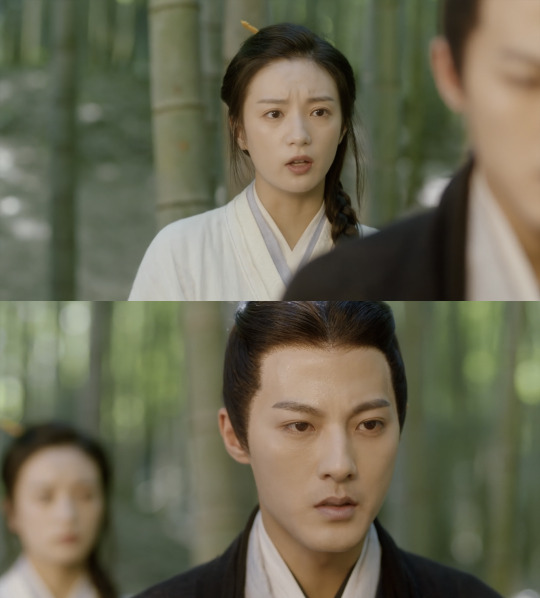
LY: Since you clearly do not wish to leave, why can you not stay? SBY: For efforts that will not lead to any results, what is the point in forcing them?
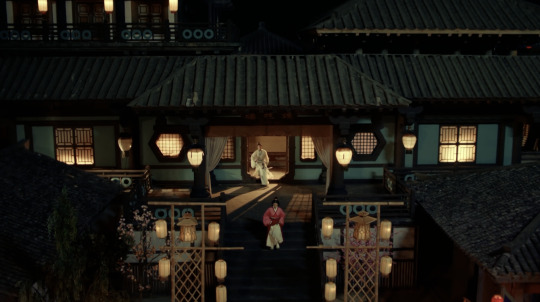
SBY: Lady Lu! What do I need to do for you to believe me? LY: Do not follow me. If you continue, I will no longer remain so polite.
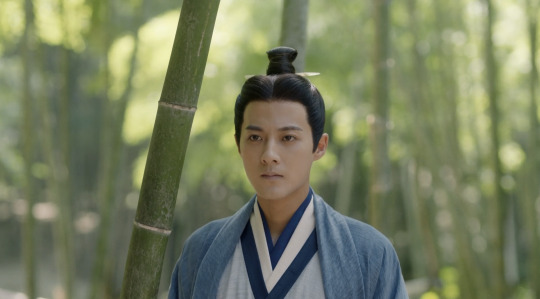
Without me, she seems to be happier.
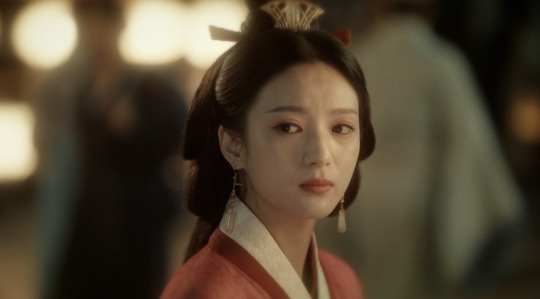
I am afraid the more that I care about him, the more I should not reunite with him.
So over these five years, she has concluded that Shen Buyan never forgot her, but instead he had no choice but to leave when she was 18 due to the reversed timelines. So every doubt she had over the last five and previous three years has been resolved.
When we think about those first three years, she waited for nothing since there was nothing promised. But in these five years, she has something to look forward to. Unlike before, she now knows for sure that she and Shen Buyan will meet again. But unlike the next leap where she knows that it will take 10 years for Shen Buyan to return, in these five years, she doesn't know how long it will take for him to come back. Shen Buyan doesn't tell her—not this time, nor when she was 18.
However, based on experience, she can guess that since their first and second meetings both took place during the Shangsi Festival, then the next time they meet will also be on the day of the Shangsi Festival. You can imagine that in these five years, during every Shangsi Festival, Lu Yuan is hoping to see him again. Maybe she walks on the street or goes to places they've been before to wait for him. But he doesn't appear until Yuanqi Year 5.
In these five years, Lu Yuan's thought process must be incredibly complicated. She has a lot of time to think about things like, How did we meet before? Why did you appear in my life? Why did we grow so attached to each other?"
At the same time, she's in a lot of pain, as she'll recall later at 26:
Each time, I harbored expectations. Yet they were shattered every time. But still, I held a little hope.
She knows very clearly that the two of them cannot be together and that they're destined to come to an end, but she can't help it. She can't control her feelings. Or, she has no way of leaving her feelings behind.
I think that these five years are much harder for Lu Yuan to endure than the previous three. Whereas in those first three years she viewed Shen Buyan as a typical romance partner, within these five years, the most painful part is having to part ways.
When two people begin growing closer, being together is part of it, but leaving one another might be the bigger part. So when they've already experienced parting from one another, the experience of a happy reunion will brand this love of theirs into Lu Yuan's life. She'll feel more and more that fate is toying with them, that it's ensuring that the two of them will never be together. That sense of fate will push her to miss him even more intensely and await their next meeting with even more anticipation.
But alongside this expectation, she may return to Nanmeng Lake and see the wish Shen Buyan made to change her fate. At this point she'll think, I want to change your fate too. Maybe I cannot change whether or not you return, but I can change whether or not you fall in love with me. By not letting you fall in love with me, by pretending to be a stranger, I can lessen your pain.
Now when you think about their interactions when she's 26 and pretends not to recognize him, you'll discover that it's actually a very sad arc.
--
Yuanqi Year 5: Lu Yuan, 26 years old
When Lu Yuan is 26, the progression of the plot is that by the time Shen Buyan arrives, Lu Yuan has already decided to ignore him. But as chance would have it, Shen Buyan saves the Emperor and follows them into the palace. Li Yong begins the battle at Huofeng Fort. Shen Buyan wants to go to battle with Lu Yuan to change Lu Shi's fate. They'll assume that they've successfully prevented Lu Shi from dying, and then they'll go to Nanmeng Lake. That is when they discover Lu Shi's fate hasn't changed at all, and Lu Yuan uses the Phoenix Tablet to take the position of Empress. Together, Lu Yuan and Shen Buyan confront the enemy outside of city walls—then Lu Yuan and Yi Hua are captured to the palace. The time leap ends when Shen Buyan takes the arrowhead from Yi Hua to assassinate Li Yong.
Let's take note of some details in this third time leap. First is that Shen Buyan makes a promise to stay. At this point, Lu Yuan doesn't say anything. Take note of her expression:
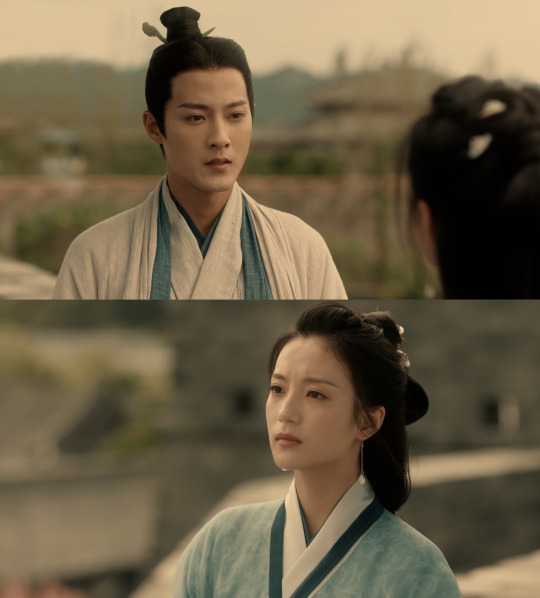
SBY: I've decided. No matter how difficult it is, I will stay here and face everything with you, together.
Based on what Lu Yuan is aware of at this point, she previously heard Shen Buyan say something similar during that rainy night in the carriage. Right after he did so, he immediately disappeared—this became a very painful memory.
But now that she's hearing it again, she doesn't say anything that would point that out. You can tell why based on something she says later:
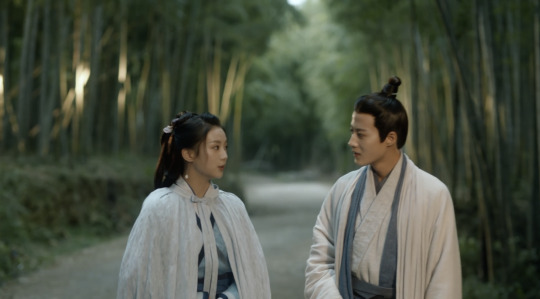
SBY: Since I have told you so much, you should tell me too. In our past, what exactly did we go through? LY: I cannot tell you that. Otherwise, once you meet the me of the past, everything you do will be too purposeful. It will not reflect your true feelings.
Then, Shen Buyan tries to assassinate Li Yong and disappears again. We know that Lu Yuan will endure 10 years of waiting.
But in these 10 years, she has something to wait for. Shen Buyan very, very clearly tells her that they'll meet again on the day of the Shangsi Festival. And within these 10 years, she will put together the events of what has happened during this leap and the previous two.
First, she'll understand why when she was 21, Shen Buyan tried to kill Li Yong immediately after arriving in the timeline. That was because right before he disappeared when she was 26, he tried to assassinate Li Yong in Lu Yuan and Yi Hua's stead. Li Yong held them as prisoners, planned Lu Shi's death, and caused the Emperor to become mentally disabled, so the first thing Shen Buyan desperately needed to do back when Lu Yuan was 21 was kill Li Yong.
Lu Yuan will remember that at the time, she rebuked him for it. That was possibly their one and only argument, but now she understands why he acted as he did. And she'll think, How ridiculous of me, that I stopped him. That I did not believe him.
Even though while she was 21, she found out why Shen Buyan wanted to kill Li Yong when she witnessed what Li Yong did to the Emperor, she didn't yet know why killing Li Yong was the very first thing Shen Buyan wanted to do. Now she does.
The second thing of note is that through this leap, she now knows how they came to love each other—more accurately, how Shen Buyan fell in love with her. She knows that the next time they meet will be a time when Shen Buyan isn't in love with her. That's because when they first meet in this leap, Shen Buyan calls her "Your Majesty." At that point, their relationship was more so him reporting his knowledge to an Empress, so there was no love to speak of.
Lu Yuan learns that the reason Shen Buyan falls in love with her during this time leap is that while Shen Buyan intended on going to take Lu Shi's place in Liuli Valley, Lu Yuan ends up taking Shen Buyan's place. That is the start of his feelings for her.
During this time leap, there's an interesting parallel that can be drawn: Lu Yuan is doing to Shen Buyan what Shen Buyan did to her when she was 18; that is, trying to end things between them. But ultimately, neither of them succeed. What provides the parallel for their shared failure are two hug scenes:
1. 26-year-old Lu Yuan obviously loves Shen Buyan very deeply, but she pretends to be distant and pretends to not know him. She keeps this up until the incident in Liuli Valley, where they come to the conclusion that they can change fate.
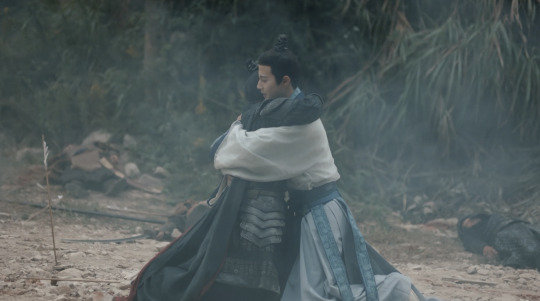
2. Compare the above to when Lu Yuan was 18 and Shen Buyan very clearly loved her, but still pretended that there was nothing between them and tried to leave. It was only when Lu Yuan told him that even if she had only 10 days left to live, she would still want to be with the person she loved that they reconcile with another hug.
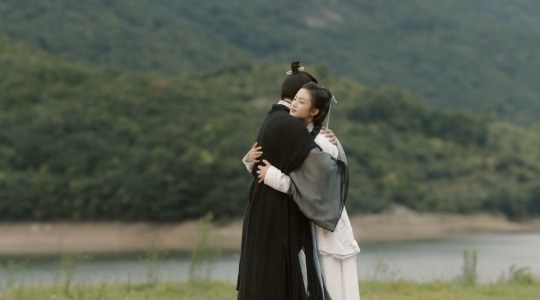
There's something additional here that will let us see the actors and directors' attention to detail. Throughout Lu Yuan's life from when she was 18 to when she's 26, there are a total of four hug scenes:
18-years-old: Shen Buyan is full of sorrow and wants to leave. Though he embraces her, Lu Yuan is still crying:
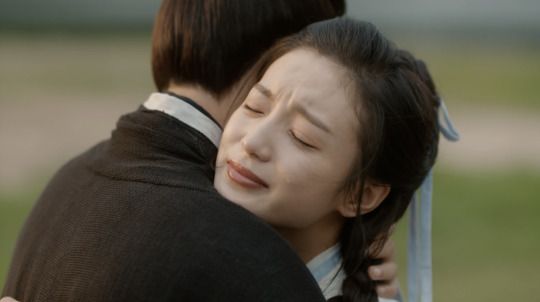
21-years-old: There are two hugs, during both of which Lu Yuan is happy, but still visibly concerned that Shen Buyan will leave again:
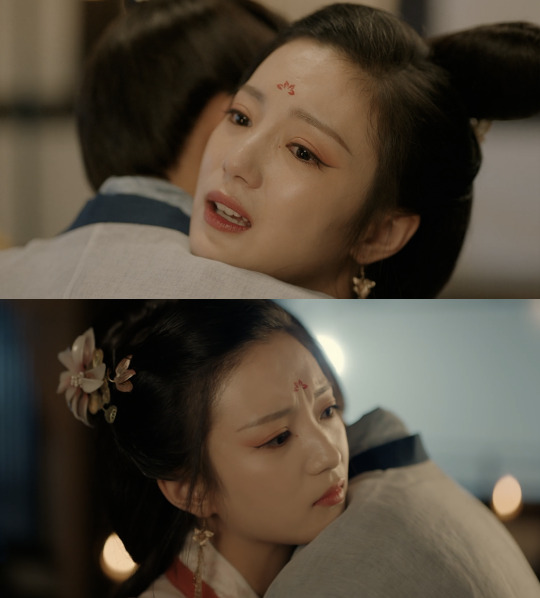
26-years-old: They embrace one another and Lu Yuan believes that they have changed fate, meaning that Shen Buyan can truly stay with her. This is the only hug in which Lu Yuan is completely happy:
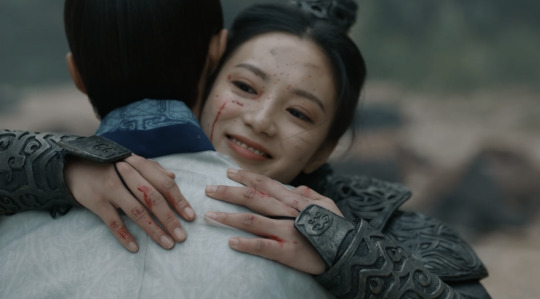
Let's now take a look at Lu Yuan's life between the ages of 26 and 36. Before disappearing, Shen Buyan tells her to "keep living."
I think this line has a very deep meaning. In a short period of time, Lu Yuan has witnessed the deaths of her little brother and her lover. They both die in her arms.
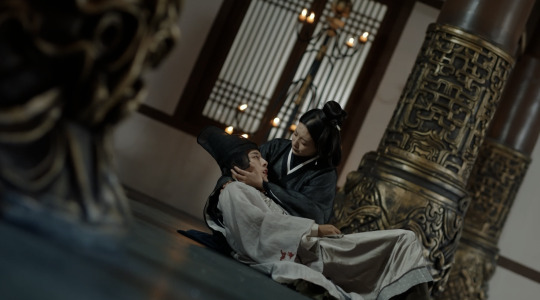
LY: I have already lost Lu Shi. I cannot lose you too.
For the sake of the country, she marries someone she doesn't love, yet she still becomes the hateful "Demon Empress" in everyone's eyes. If it weren't for Shen Buyan's words and his 10-year promise, if it weren't for Shen Buyan telling her to keep living, if it weren't for the thought that Shen Buyan's sacrifice won her the opportunity to end the war...it's greatly possible that Lu Yuan couldn't have lived on.
We can also feel exactly how difficult it is for Lu Yuan in these ten years. Even though she has no longer has the military support of her brother, she slowly grows while tolerating it all. She gradually forces Li Yong from a position of great power to fleeing to Beilie with the city defense map. In these ten years, she also puts her soul into raising and teaching Chu Tongchang. She must pass down all the knowledge she gained from Shen Buyan to Chu Tongchang—after all, this child is the direction and hope that Shen Buyan brought to her in this latest time leap.
In these ten years, she also walks without hesitation toward her destiny. She now understands everything about the story of her and Shen Buyan. When she thinks about all their short encounters, she will remember that even though Shen Buyan does not have memories of the times they spent together, he still has feelings for her while respecting her decisions. From the very beginning, he has been someone who will sacrifice himself to protect her—even when he didn't have feelings for her.
To Lu Yuan, someone who maintains such a pure heart at every moment and who is constantly trying to change her fate will inevitably move her over and over again. All of these beautiful yet painful memories support her lonely self and become her motivation to keep moving forward in the palace.
So although these ten years are long, Lu Yuan waits and prepares amidst her sorrow for the Shangsi Festival that she and Shen Buyan promised to each other.
Knowing that he would arrive in ten years gave me endless hope in those long days.
--
Yuanqi Year 15: Lu Yuan, 36 years old
36-year-old Lu Yuan meets Shen Buyan, who views her as a stranger. For answers to three of his questions, she exchanges three favors: changing his clothes, having a meal, and roaming about the festival. After a brief reunion, Lu Yuan uses the information that Shen Buyan gave her ten years prior to corner Li Yong. She blocks an arrow for Shen Buyan and ends this time leap. Out of all the time leaps, this is the shortest one, but the amount of emotion in it is the deepest and most enduring.
Let's look at these three favors. When we watch the show, we think that these are things Lu Yuan is completing based on what she always wanted to do with Shen Buyan during the Shangsi Festival. Of course, this is the first level of meaning.
We know that within the last ten years, based on the information that Shen Buyan provided her when she was 26 and his attitude toward her, she will conclude that this next meeting of theirs will be very short. Then she'll think back to the time when she didn't recognize Shen Buyan and how he treated her back then.
Lu Yuan knows that she won't have the same amount of time as he did. When Shen Buyan met her for the last time, he left behind knowledge, the konghou, and the jade. Through these, he gave her things to reminisce over during her future days of sorrow. So, she also wants to leave something for Shen Buyan.
She thinks about how in the days that she spent getting older, the one thing she kept wondering was whether Shen Buyan still loved her. Hence, she wants to find some way to tell the future Shen Buyan that in these ten years, she was constantly thinking about him.
Of course, an overly direct confession to someone who doesn't know you will only scare them. She must think of alternatives. I believe that in the three favors, aside from fulfilling her own wishes, they also contain all the things that Lu Yuan wants to tell Shen Buyan.
1. Changing clothes: These clothes are ones that Lu Yuan made for Shen Buyan when she was 18, but she was never able to give them to him. When she was 21 and they went back to Nanmeng Lake, the director took care to give a close-up of Lu Yuan packing up these same clothes.
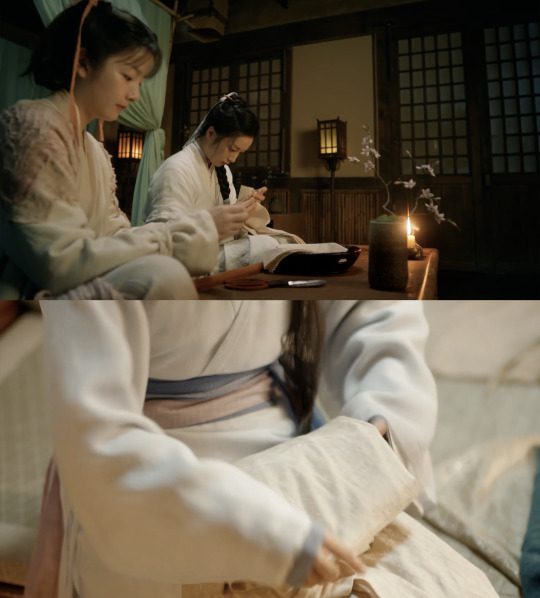
Top: 18-year-old Lu Yuan sewing the clothes - Bottom: 21-year-old Lu Yuan packing them up
She brought them to Nanmeng Lake, so why is it that she still didn't manage to give them to him? When we think of the possibilities, we have to consider that making clothes by hand in ancient times was typically done with the intention of giving them to lovers or husbands. You can think of this as a method that women could use to more directly confess to someone within a conservative society. Lu Yuan has also always been someone to whom such rituals are important, as displayed by this scene from when she was 18:
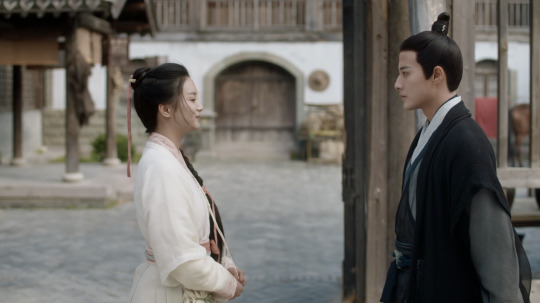
LY: I finally have the opportunity to tell you. You still owe me one last lesson. I hope that after that lesson is complete, we can find a place with just the two of us so I can tell you.
When she was 21, even though they were together, Lu Yuan was preoccupied with how to convince the Emperor against war. Not to mention, she also thought that Shen Buyan wouldn't be leaving again. What she wanted was to give him the clothes properly, after they managed to persuade the Emperor. But we all know what happened.
I don't think that the gifting of clothes is a simple gesture. In the Classic of Poetry that she and Shen Buyan use as a code book, there's a poem called "Zhengfeng Ziyi." It talks about the feelings of a wife as she makes clothes for her husband, representing the way that women in ancient times expressed love. By finally giving Shen Buyan these clothes, Lu Yuan believes that later—when Shen Buyan will go over the Classic of Poetry with her 18-year-old self—he will then understand the silent confession of her 36-year-old self.
And when we look at her pained expression in this scene, we can imagine that from the moment she finished the clothes, she has pictured personally giving them to Shen Buyan and seeing him wear them an infinite amount of times.
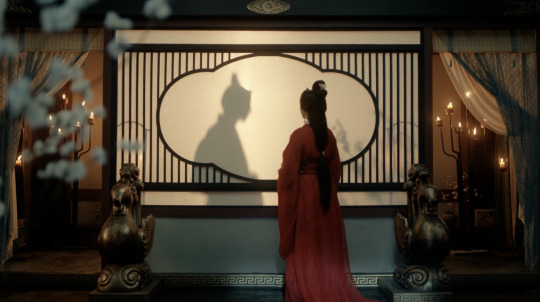
SBY: How did she know my height and measurements?
2. Having a meal: We know that Lu Yuan made the food, but what I want to focus on is how the act of having a meal represents Lu Yuan's attachment to Nanmeng Lake.
Nanmeng Lake was a part of every prior story of theirs. The beginning of their story took place at Nanmeng Lake. She also requests to Chu Tongchang that she be buried there. So she really hoped that she and Shen Buyan could go back there together.
But she knows that their reunion will be very short, and she also has to remain in Jiangdu to counter Li Yong. Knowing that they can't go back, she could instead make food from Nanmeng Lake.
In the past, it was always Shen Buyan and Yi Hua who would grill fish for her. I think that over the last ten years, Lu Yuan practiced cooking this meal repeatedly. Because she knows that once Shen Buyan goes to the past, he will understand what she wanted to tell him through this meal: "Although I am in the palace, my favorite food is still that simple food from Nanmeng Lake. Although I gave up our love over and over again for the sake of my country, all I really want from the bottom of my heart is to go home with you. I wanted to do as you asked when I was 21, and settle down with you at Nanmeng Lake."
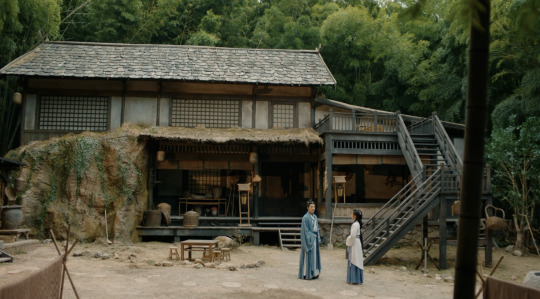
SBY: Are you willing to leave Jinghua House and Jingdu to settle down at Nanmeng Lake and stay with one another?
3. Roaming the Shangsi Festival: 21-year-old Lu Yuan's dream was to spend Shangsi Festival on the streets with Shen Buyan. 36-year-old Lu Yuan takes a willow branch to drive calamities away from Shen Buyan.
In this scene, Lu Yuan hasn't actually told him everything about this tradition. To complete her explanation, the director and writers borrow the voice of an old town crier in every successive time leap:
I wish that all of Dasheng's people may drive away calamity from themselves, and welcome the return of their beloved!
Yes, Lu Yuan only tells Shen Buyan half of the tradition. What she leaves out is also the answer to his last question:
LY: My regret is not being able to spend the Shangsi Festival with someone. SBY: Who? LY: Is that your third question? You will find out next time.
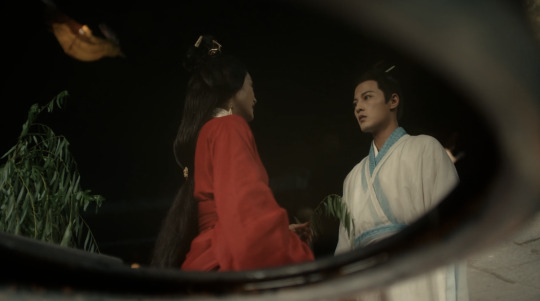
The answer is: "May you avoid calamities. I have welcomed the return of my beloved."
I think these favors form the best method that Lu Yuan can come up with that both wouldn't disturb Shen Buyan and also express all of the longing and love she has felt in these ten years.
With this, the time leaps forming the main story are effectively over. To Lu Yuan, these four encounters with Shen Buyan encapsulate all the love in her life. Each encounter was shorter than the last, and each time she had to wait longer. I think she doesn't regret meeting Shen Buyan, but she grieves that she keeps waiting longer and longer and loves him deeper and deeper, yet their periods of reunion are shorter and shorter. She laments that they never went back to Nanmeng Lake and that they couldn't say a proper farewell.
--
The remainder of Lu Yuan's life
The first shot after the time leaps is of Yuanqi Year 20, where Lu Yuan is hanging another wish tablet, on which she has wished to meet Shen Buyan one more time. The second shot is of 56-year-old Lu Yuan sitting atop the city gate, where she sees Shen Buyan in the last moment of her life before she jumps down.
A few details: in the scene where Lu Yuan is hanging the wish tablet, take note that like Yi Hua, she is in mourning clothes. Aside from the death of Lu Shi that occurred when she was 26, I think that when she was 36, she also started mourning for Shen Buyan. Because in her heart, Shen Buyan was her lover and husband.
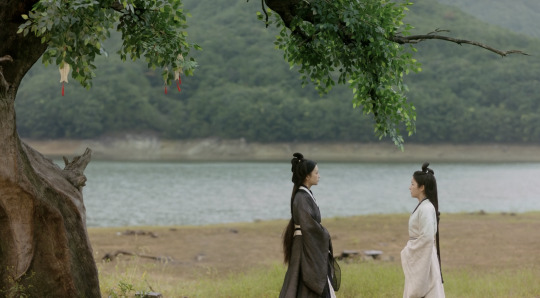
Important to note is that at this time, we're still tracking the years by the Yuanqi calendar. "Yuanqi Year 20" means that Emperor Yuanqi hasn't died yet. In a time when the Emperor isn't dead, the Empress dressing in mourning clothes must have caused her to be on the receiving end of much negative sentiment.
The second detail is that Lu Yuan believes that fate has changed since she didn't die that night in the palace. In actuality, her fate hasn't changed at all. It's just that when Shen Buyan left, he didn't know that her death was fake, so from his understanding, he always thought that she died after being struck by the arrow. Maybe Lu Yuan considered that, but in all her years of waiting, she needed a reason to keep going.
The third detail is that after the time leap from when she was 36, she has waited for Shen Buyan for 20 years. Her biggest question in these 20 years must have been, "Does Shen Buyan still think of me?" She kept missing him, but she knows that it's probably only been a few months to Shen Buyan. Compared to the separation that death brings, the more distant separation comes with time. She doesn't know whether or not Shen Buyan will forget her in the time to come, or if he'll still miss her.
I tend to think that Lu Yuan never arrives at the answer to this question as she approaches the end of her life. A lot of people think that 56-year-old Lu Yuan remembers that she met Shen Buyan when she was 6. I don't think that this is logical, especially since she doesn't address these memories directly in her narration of the special episode. So I believe that she struggles with this question until she dies.
The fourth detail is with the old woman who sold the jade to Shen Buyan. Her life's duty is to give the jade to someone called Shen Buyan and tell him to hang a wish tablet. Her request for him to do so is also quite insistent.
When some viewers discovered that this old woman isn't Lu Yuan, they felt a bit disappointed. But if you think about the context of this woman being a descendant of the Chu family, it makes the story even more impactful.
We all know that Lu Yuan doesn't have any descendants, but Yi Hua, who she considers family, also doesn't. Only her adopted child Chu Tongchang does. We can deduce that Lu Yuan spends the rest of her life thinking of Shen Buyan and must repeatedly tell Chu Tongchang that the jade and the wish tablet request must to be passed down to his descendants. And we can see that this will become the most important duty of the entire Chu family. Otherwise, how could her requests survive so many years until modern-day?
The fifth detail is regarding elderly Lu Yuan and the konghou with the snapped string. My personal take on this is that when elderly Lu Yuan saw Shen Buyan when he traveled for the very first time, "I miss you" was what she wanted to tell him. At this point in time, Shen Buyan doesn't know anything. But once he experiences everything and sees that konghou with a snapped string being excavated, he will understand that the ancient love song Lu Yuan played that day and her breaking a string upon seeing him will have been her saying "I miss you" before she jumped.
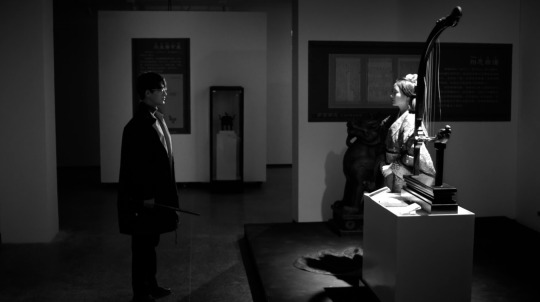
SBY: I do not understand either. How about you tell me? LY: I...miss you.
When Lu Yuan leaps down from the city gate, aside from it being an act to take responsibility for all the nation's anger, it can also be considered a form of liberation. I think that after witnessing the deaths of Lu Shi and Shen Buyan, she had already considered dying, but two things kept her going: one being that she had to raise and teach Chu Tongchang, another being that she had to wait for Shen Buyan.
But in 56-year-old Lu Yuan's life, Chu Tongchang is already an adult who can handle himself. She's waited for Shen Buyan for 20 years, and he hasn't shown up. She can let go now. Yet her sincerity proves fruitful, because in her last moments, she sees Shen Buyan again.
In that scene of the rainy carriage night when Lu Yuan was 21, she said the following to Shen Buyan:
You and I have different duties. With our different duties, we walk in different directions.
Lu Yuan's duty is to end a tumultuous period and raise an emperor who will unify the nine nations. Shen Buyan's duty is to track history and restore Lu Yuan's good name.
Lu Yuan of the past never cared about the burden of the mark "Demon Empress." Shen Buyan of the past never cared about the Sheng nation's fate. With that, they were destined to move in opposite directions. But as time passes and they near the end of their lives, they have both slowly changed their previous perspectives and eventually end up on the same page.
Lu Yuan was always protecting Shen Buyan. Physically, but more so emotionally. Apart from when she was 18 and 21 and didn't know the truth of their situation, she constantly restrained herself starting at 26. She did so toward the lover of hers for 5 years, 10 years, even if it meant each reunion could possibly be the end of any beginnings.
Shen Buyan was also always protecting Lu Yuan. With a very average physique, he stood up for her in the middle of danger and revolt. During war, he was willing to take her brother's place in facing death. In the palace, he attempted to assassinate Li Yong to protect Lu Yuan and Yi Hua, buying Lu Yuan 10 years' worth of time to repair the nation of Sheng.
Aside from protecting her, Shen Buyan also respected her choices. Once he learned of 18-year-old Lu Yuan's wishes to depart for Beilie—even though he knew this was the last time he would see her—he respected her choice and said nothing but his last farewell. I think this is the true meaning of Shen Buyan's name (T/N: "Buyan" literally means "without speaking").
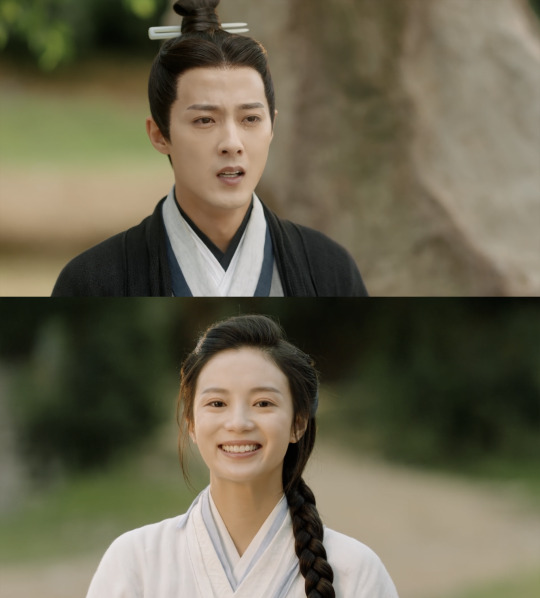
LY: See you again! Wait for me! You have to wait for me! SBY: See you again!
Now that we're at the end of the story, I want to interpret her line of "I have grievances, but no regrets."
She doesn't regret meeting Shen Buyan. It's in her persistence in leaving behind something for Shen Buyan before she dies.
She doesn't regret showing courage. In each short encounter she had with Shen Buyan, as an ordinary woman during a conservative time period, she still bravely expressed her own feelings. She didn't let any meeting of theirs simply slip by.
She doesn't regret that she spent her life lamenting a lost love. In the last episode, they describe that Lu Yuan was buried in Nanmeng Lake. Buried alongside her were the konghou and the sheet music for a love song. She spent her whole life performing and interpreting this ancient love.
She also doesn't regret giving up family, love, and her own life for the sake of her country.
As for her grievances, I believe we already know what those are.
#an ancient love song#古相思曲#subs*#idk why i thought watching these videos would make me feel less sad#but here we are#not less sad#do y'all think that eventually there won't be a 30 image limit#that would help me greatly with these types of posts#TOO MANY GOOD SCREENSHOTS
51 notes
·
View notes
Text
Some times ago Neil Gaiman posted on his Tumblr blog about a project he had of, if I recall correctly, a movie adaptation of “Journey to the West”. One of the reasons he gave as to why he gave up on the project was that he realized that this work didn’t need to be retold by an European - I do not have the exact quote, I am just saying things out of memory. This post, and the topic of “Should non-Chinese people make fictional works based on Journey to the West?” made me think back to a book that would have made me answer “Yes, non-Chinese people can retell Journey to the West”. And this book would have made me answer that - if I had been asked - because it is such a beautiful and funny book. I even hesitated to share about it here because this book is truly one of my little treasures. I read it when I was a pre-teen and it marked me deeply and if I were ever to lost it I’d buy it again because I couldn’t imagine having a library and not having this book with me. And it isn’t just teenage nostalgia speaking because, re-reading it as an adult, I still find new entertainments and fascinating meanings and implications that I completely missed as a young kid not knowing much.
I had a bad literature school-teacher at the time and when she heard about me reading it, she answered that it wasn’t good for young minds to read these kind of works because they “mixed the genres” and blurred the lines of the categories of literature - she much preferred that kids would have much more categorized works that clearly and easily fit into one genre or the other. That’s the kind of bad literature teacher you’ll probably all recognize somehow, and this already places this book as one of the things these people do not like. But to take this book merely to spite those that wrongly understand literature would be a shame, because this book deserves to be loved on its own for the shere amount of work, poetry and love that its own author put into it.
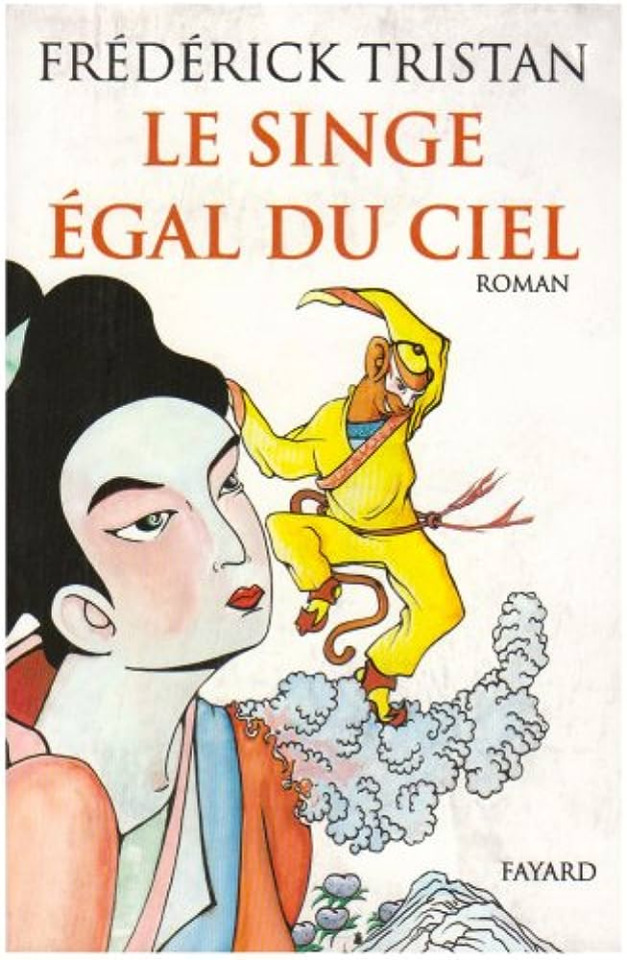
This book is probably the greatest French reimagination of “Journey to the West” I can think of - it is “Le Singe Egal du Ciel”, “The Monkey Equal to the Sky”, by Frédérick Tristan, originally published in 1972, but still printed to this day. And before the Journey to the West purist start attacking me like rabid dogs, I insist on the term “reimagining”. It isn’t an adaptation of the work, and it is not a question of being a faithful translation of the original epic. It reimagines, re-arranges, re-creates the Journey to the West plot and characters into a story that is, on its structure and foundations, identical, and yet couldn’t be more different than it. And it is a good thing, because it is the power and strength of this book.
I heard that Tristan’s books were translated in English - which doesn’t surprise me given he is one of the great French authors of the late 20th century - but since I do not know if this specific book was translated, and under which title, I’ll use the French title translated into English, The Monkey Equal to the Sky. What is “The Monkey Equal to the Sky”? It is, as I said, Journey to the West retold, but condensed, trimmed down and cut short to fit into one nice fantasy novel of forty-two chapters. Some of you hearing that might feel some sort of self-righteous nausea, saying “If they cut down anything from the original plotline, it is not worth it, better read the full original”. But again this would miss the point of this wonderful book: to someone with bare knowledge or no knowledge of the original epic, it is a great introduction and first discovery, by having a shortened story centered around the key characters and events, while also being different enough so that when said nocive in ancient literature gets to read the original epic, they’ll have an entirely new world to discover. But to the other side, to those who are very familiar with Journey to the West, it will be a fun entertainment and deforming mirror, as Frédérick Tristan truly plays with the original text, creating a game of correspondances and analogies, uniting several different characters into one, inter-connecting strongly the “before” and “after” parts surrounding Sun Wukong’s imprisonment under the mountain, and ultimately making it even more obvious than the greatest monkey of them all is the main character and protagonist of the tale.
Because this is what Tristan wanted to do before all: tell the story of Wukong, all about Wukong, as the protagonist, hero, antagonist and villain of his own tale all at once. The story might be changed, but trust me, the character of Wukong isn’t in the least, because this book is filled with the spirit of Journey to the West and the Monkey King, if not with the detail. I will tell you already the very bold move Tristan did, to really make this story even more about Wukong than it was originally: in Tristan’s novel, there is no Tripitaka. The monk that is charged with fetching the sacred texts in India and who is surrounded by three disciples is rather... Sun Wukong himself, or rather his fictional equivalent here, The Monkey-Equal-to-the-Sky (also undergoing his religious name, Aware-of-the-Vacuity, Conscient-de-la-Vacuité). It might seem like an insane thing to do, but it WORKS. Of course, those that will be looking for some of the readings of the epic - such as a dissection, exploration and study of the human soul, psyche and personality between the various impulses, emotions and vices, throughout the metaphorical characters of Tripitaka and his disciples - will be disappointed because Tristan’s novel is not a psychological one. But instead, what you have is a careful balance between existential horror and a cosmic farce - some sort of impossible mix of Lovecraft’s cosmic dread mixed with the world-questioning humor of Good Omens, and even then the comparison is a very poor one missing out on the very peculiar, unique and poetic feel of this novel. It is about this monkey, who is all powerful and yet constantly bound and chained by something, it is this monkey that clearly is the voice of reason of the world and yet acts like a madman, this monkey that is a living paradox - and the story is about how his very existence throws an ordered world into chaos and forces it to be rebuilt and undergo a full renewal. It is the story of how, by merely existing, this character that does both heroic deed and monstrous actions, challenges the very notions of supreme powers, of existence, and of reality. It is a buffoonic Shakespearian comedy where the trickster-monkey mocks, beats up and scams everyone and everything, it is an apocalyptic work where we see what happens when something unexpected and that should not exist destroys the very foundations of the world, and it is a philosophical and religious investigation as the monkey searches for, studies, explores and quests for the powers, the meanings, the morals and the truths behind religion, absolute purity, true virtue, and the world.
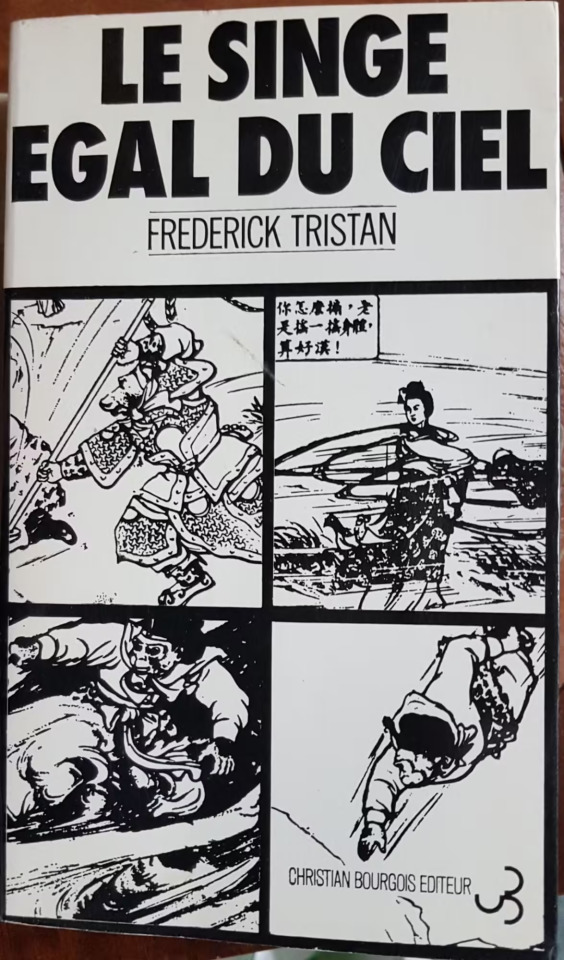
It sounds like a LOT for a novel that is actually a shortened and condensed version of Journey to the West, but that’s the secret: by mixing various characters into new ones, by changing slightly the focus of the story, by giving new angles to some episodes and scenes, Tristan opens up a whole new space and vast expanses of literary terrain on which he adds tons of fascinating content and fresh details to retell the story with new meanings. Frédérick Tristan himself put a Warning in his text as a foreword, explaining the various inspirations of his work so that people did not mistook his novel for a mere adaptation of Journey to the West: because beyond the great Chinese novel we all know, he also took elements from other texts that also told of the legend of Sun Wukong (Journey to the West merely being the most famous and most complete of the various tellings of this ancestral legends), as well as various stylistic ingredients and poetic tones from the various historical translations of the work in Europe - such as the first French and British translations. In the same foreword, Tristan does spell out his intentions of completely reversing the original meaning of the novel by making Sun Wukong take the place of Tripitaka during the pilgrimage to India.
And even beyond his extensive researches surrounding the figure of Sun Wukong himself, Tristan also slid in his novel various elements from both European and Asian traditions. European because he places here and there subtle references to European fairytale structures or old European myths (though I have to say they were subtle enough that I didn’t notice them until it was pointed out to me). As for the Asian inspiration, this allows me to break down another of the arguments people who do not know about about Frédérick Tristan might raise: what does an old white French dude knows about China anyway? As it turns out, a lot, and that’s not just his obsession with the Sun Wukong legend. Frédérick Tristan lived from the late sixties to the mid-eighties half of the time in Eastern and South-East Asia. He was at the time not a yet recognized author, but a mere specalist of the textile industry, forced by his father to inherit the textile business of the family against his son’s poetic and literary aspirations. His positions led him to work on official business matters in China, Cambodia, Vietnam and Laos - and during his trips, visits and stays there he became enamored and fascinating with their history and culture. China most of all became his main dream and subject of study: “The Monkey Equal to the Sky” is but the first of a series of six “Chinese novels” each one taking inspirations from various elements of Ancient China. Sometimes he retells and weaves stories based on Chinese myths, like with “The Monkey Equal to the Sky”, whereas other times he rather explores various religious and philosophical aspects of China through the means of fiction. In one he recreates the koan genre in the rules of the art, in another he proposes a fictional exploration of the roots and teachings of taoism, and in yet another novel he pays homage to the works and style of Pu Songling.
And if he knows so much about China, it isn’t just because he loves to write stories about it - he also published serious, profesionnal, recognized works about Ancient China. His most famous work being “Houng, les sociétés secrètes chinoises”, an essay about secret societies in China centered around the rites and practices of the Tiandihui. And his historical and cultural knowledge of Ancient China, its philosophies, its literature and its secret societies helped him recreate another semi-historical semi-mythical China for “Journey to the West” or rather an anti-Journey-to-the-West, to be played in.
I could speak much more of Frédérick Tristan, of his work, and of the beauty of this novel, but I will merely say that, if you enjoyed Journey Through the West, and enjoyed its characters, you will definitively find Tristan’s novel very entertaining. And if you ever have the chance to read it in French, do so, because - again - I do not know if an English translation is available, and if it is I cannot attest of its quality since I never read it, but I hope the brilliantness and fun of the text will be carried on throughout the language barrier.
#journey through the west#sun wukong#frédérick tristan#the monkey equal to the sky#novel#china#ancient china#french literature#my favorite books#books to be read at least once in your life#french novel
39 notes
·
View notes
Text
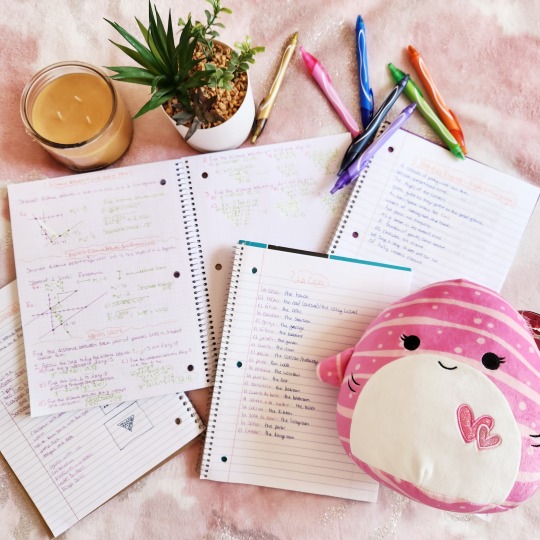
Friday, February 23, 2024
I am posting this on Saturday because H's mom needed to drop her off early since something came up on her end, so I never got the chance to post my Friday update. We had fun though. I still had my piano practice to do, so while I practiced, she worked on a few things that she needed to finish. On the other hand, she did say that my playing was beautiful, and I was elated to hear.
H also plays, but she goes back and forth between enjoying it and doing it because she wants to be done with it and her mom wants her to at least complete Level 10 and then if she wants to stop, she at least knows how to play extremely well in case she ever wants to come back to it in the future. I told H a while back when that was decided that I agreed with her Mom. It was good to at least have the knowledge as she didn't know what she would want in her future, so she plays often when she's in the mood and not often enough when she has no motivation. It works for her, so who am I to say anything?
I plan on doing ARCT and then I'll feel like I've mastered to where I want to be. I'm a completionist, and I actually do enjoy playing. It's why I'm trying to find more time. I want to finish by the time I finish my HS studies, but I also heard that I need ample time for the ARCT since it's a whole other level. If I pass my Level 9 exams, then I can start Level 10 and plan on completing that by the end 10th grade and then I would have two years to prepare for the ARCT exam. That's my plan anyway. My parents don't really care what I do as long I continue to enjoy playing. It's merely hard to find the time to practice! I can only do it by cutting short my supplemental study time, which I have done, but I don't really need a full 2-3 hours for that since I cut my reading down to only one extra book at a time instead of a supplemental book and a fun book along with assigned readings.
Am I doing too much? Sometimes I feel like I'm not doing enough at all.
It's time to practice again. I'll try to update about today (Saturday) a bit later.
Tasks Completed:
Geometry - Reviewed solving systems of equations graphically + reviewed equations of parallel and perpendicular lines + learned to find the distance between a point and a line + learned to find the shortest distance between two parallel lines + practice + honors work
Lit and Comp II - Reviewed Unit 16-18 vocabulary + read second part of chapter 26 of Emma by Jane Austen + read about understanding poetry + read about how to analyze poetry + read poems and marked figurative language identified + wrote a short poem using figurative language describing a scene from a photograph
Spanish 2 - Copied new vocabulary
Bible I - Read Joshua 17-18
World History - Watched lecture videos on what and why on the origins of WWI + started writing an essay describing how Balkan nationalism, entangling alliances, and militarism led to WWI (due Monday)
Biology with Lab - Finished my human impact presentation + presented to dad
PE/Health I - Read an article about resources for teen depression and stress
Foundations - Read the definition of resourcefulness + completed one minute creativity exercise + identified fallacies in stories and arguments
Piano - Practiced for two hours in one hour split sessions
Khan Academy - Completed World History Unit 6: Lesson 1 (parts 6-7) + completed High School Geometry Unit 6: Lesson 4 (parts 1-3) + Unit 6: Lesson 5 (some was assigned)
CLEP - None today
Duolingo - Studied for 15 minutes (Spanish, French, Chinese) + completed daily quests
Reading - Read pages 220-259 of My Dear Henry: A Jekyll & Hyde Remix by Kalynn Bayron and finished the book
Chores - Dusted my bedroom, my bathroom, and the study + laundered my bedding
Activities of the Day:
Personal Bible Study (Matthew 28)
Ballet
Pointe
Journal/Mindfulness
-
What I’m Grateful for Today:
I am grateful to have my friends over again tonight for a sleepover to get ready for our second to last cookie booth tomorrow.
Quote of the Day:
Never underestimate the power of dreams and the influence of the human spirit. We are all the same in this notion: The potential for greatness lives within each of us.
-Wilma Rudolph
🎧Symphony Op. 11 No. 1 in D major (Overture; 'L'amant anonyme') 1. Allegro - Joseph Bologne, Chevalier de Saint-Georges
#study community#study blog#study inspiration#study motivation#studyblr#studyblr community#study-with-aura
6 notes
·
View notes
Text




Doing another book review, yo!
I recently had the pleasure of discovering poetry (or rather, rediscovering poetry, since I used to enjoy reading it as a kid) thanks to a class on children’s literature genres that I took for my Library Science degree. While working on an assignment to survey part of the children’s section at my local library and found a bunch of great kid’s poetry books and thought I’d share a few of them. Hopefully y’all might find some that interest you too.
YES! WE ARE LATINOS
By Alma Flor Ada and F. Isabel Campoy, with drawings by David Diaz
This collection of free-verse poems is about the experiences of Latino children in the United States, showcasing a great diversity of characters who are Black, Indigenous, white, and of mixed Hispanic heritage. The book also includes groups who may not be as widely known, such Latinos of Japanese and Chinese descent, and Sephardic Jews who fled Spain in the Middle Ages. Each poem is accompanied by background history on topics such as the Spanish Civil War, migrant farmworkers and African heritage. These notes especially appealed to me because they gave each poem more context and really helped build an appreciation for the history and experiences of Latino culture.
The poem titles follow the same formula: “My Name is ___” followed by the ethnicity and cultural relationship of the narrator. For example: “My Name is Monica. I Am From El Salvador. I Live in Houston. I am Texan. I am Latina.” Each is a short vignette in the life of a Latino child. There is a girl questioning what she wants in life as she prepares for her quinceañera; a migrant worker boy catching a ride in his father’s truck and thinking about the life he left behind in Mexico; A boy dreaming about becoming a painter; and more. Though the stories differ, there is a strong theme running through them about dreams for the future and building a better life.
Poems are written in a free verse style which mimics prose speech. This may bother those used to more traditional rhyming couplet poetry. But for other readers the natural flow of the sentence may make it easier to follow the stories.
Each poem is accompanied by Diaz’ black-and-white illustrations which resemble wall murals, Mexican papel picado banners, and even shadow puppets.
Oddly, despite trying to encompass the breadth of Latinx people, the book glaringly does not feature any characters of Brazilian ancestry, even though this country is the largest and one of the most diverse in Latin America. The book also lacks characters from other countries where Spanish is not the dominant language, such as Suriname where Dutch is the official language, French Guiana where French is mainly spoken; or Guyana and Belize where a sizeable portion of the population speak English. Indeed, the book seems to be focused mainly on Hispanic identities with a few exceptions such as the Sephardic Jewish family in “My Name is Sultana, o Susana”, and the white Spanish family in “My Name is Rocio” who fled to Mexico, then the US during the Spanish Civil War. While these omissions do knock the book down a little in my rating, the collection does a good job of highlighting the diverse Latino identities of people living in the United States. And as Ada states in the Introduction: “Whatever your background, this book is an invitation to look inside yourself.”
Yes! We Are Latinos is available on Amazon or though Bookshop.org
5 notes
·
View notes
Text
~{ Hello World }~
Welcome to my personal blog, where I post whatever and then some!
I am Cyana and at the moment use she/her pronouns. I'm currently studying computer science, and make art and write as a hobby.
If you are a terf or in any other way exclusionary, dni. This is not the place for you.
Here are some common tags I use:
#[trigger] tw (Plain Text: #[trigger] tw): trigger warning format I use. I try to avoid reblogging harmful content; if I missed a tw tag on a post, please let me know.
#cyana.png (PT: #cyana.png): for all my art.
#cyana.txt (PT: #cyana.txt): listen to me rambling on about everything and anything
#cyana.odt (PT: #cyana.odt): all my writing can be found here, not that it is that much.
#cyana.recipes (PT: #cyana.recipes): a collection of recipes.
#cyana.zip (PT: #cyana.zip): all my archived collections sorted by topic. See the archive master post.
#cyana.ask (PT: #cyana.ask): all my answered asks.
#cyana.crafts (PT: #cyana.crafts): all my crafts.
#cyana.add (PT: #cyana.add): my additions to other people's posts.
btw these tags are custom coloured in my blog theme how awesome is that! well most of them, still working on the theme... (and now none because I changed the names; to be fixed)
That's all!
Much love 💜
Cyana / CEa_Tide
some miscellaneous tags I use (mostly for myself as a ref)
Biology/Nature: - #biology - the science - #nature - photos of nature - #animals - pictures of animals. Common specific animals are sometimes only tagged with their own like: #cat #doggo #spiders #duckies #birb Art: - #art - art tag - #character design - art of characters posing, character refs, etc. - #aestheticposting - aesthetic photos - #street art - art, graffiti, and stickers on the street - #graffiti - all graffiti - #stickers - all stickers - #cyana.png - my art tag - #cyana.odt - my writing tag - #cyana.crafts - all my crafts - #comics - comics - #manga - Asian comics (I know it is only Japanese; Chinese is manhua etc. Tag is used as a catch-all, and if needed the actual name is also tagged) - #story rb - short stories/writing - #poetry - poems - #art advice - advice about creating art / art techniques - #art resources - resources to be used when creating art - #writing advice - advice about writing / writing techniques - #writing resources - resources to be used when writing - #music - all music posts - #fashion - fashion/clothing posts
Queer/LGBTQIA+: - #trans - trans stuff - #lgbtqia+ - general queer/lgbtqia+ stuff - aro - aromantic stuff (sometimes double tagged as #aromantic) - ace - asexual stuff (sometimes double tagged as #asexual) - #lesbian #gay #intersex etc. - other more miscellaneous queer tags - queer history - information about queer history - trans science - science articles about transgenderism, debunking transphobia, etc.
Books: - #cyana.epub - books I want to read later - #books - stuff about books that doesn't fit into the above tag
Tech: - #tech - tech posts - #programming/#code - posts about programming - #firefox - Firefox/browser propaganda, ad blocking, privacy stuff - #internet - posts about the internet in general
Miscellaneous: - #to read later - posts to come back to and read linked articles/post itself - #yy - posts to come back to - #yy.inspo - for art/writing inspiration - #to be archived - posts not yet sorted into the archive - #archived - posts added to the archive - #fav - my favourite posts - #polls - all poll posts - #tag for when sad - cute/positivity stuff - #science - science posts/research - #cyana.recipes - recipes I want to save - #cyana.zip - archival posts. See above for master post. - #cyana.ask - all answered asks - #cyana.txt - personal posts - #cyana.add - my additions to other people's posts.
Note to self: #yy.inspo (I should also start tagging if art/writing) More tags: #crafts #embroidery #sewing #dragons #mermaid (change to #oceanfolk to include other oceankin too) #knitting #catgirl (also/instead tag w/ #cat person) #witches #pride flags (remove #pride flag) #calligraphy #beastfolk
fandom tags: #spiderverse #sousou no frieren #nimona #good omens #witch from mercury #the guy she was interested in wasn't a guy at all #tamen de gushi #dungeon meshi #bocchi the rock and more...
8 notes
·
View notes
Text
There’s also something about the ways in which people spend their whole fandom experience talking shit about how “useless” or “annoying” the actual marginalized characters are…
Instead of. I don’t know.
Actually going to read books and watch movies by BIPOC, disabled, queer, and otherwise marginalized folks.
Please: Instead of reblogging that 1000-word, rightfully angry thinkpiece about whatever BIPOC character in whatever show…
GO READ BOOKS RECOMMENDED AND WRITTEN BY ACTUAL BIPOC FOLKS.
Are they going to cover universal experiences? No!
Will they always be good: Of course not! Most writing is crap, and giving much higher standards to marginalized folks is just. Absolutely ridiculous.
There’s so much variety: I actually love reading “trashy” things, and holy Fuck… Please read actual camp. And I’m not talking about OFMD. Like go to a library and pick up something unsanitized.
And also, some important advice: DON’T BE A FUCKING JERK WHILE READING.
Like, I know some people who just picked up one book by an Indigenous author and who just. Immediately bitched about how “bad” and “unrelatable it is.”
It was for a project in school:
The book was There There, by Tommy Orange.
We weren’t even assigned more than the first chapter by that point.
Please don’t do this. Please give the same patience to marginalized authors that you do to the 50k slow-burn fic about those two white dudes that I know you’re able to read.
“But powerfulblob, I’m literally queer and disabled! I don’t have time!”
You know what? So am I.
But I still take time to do this.
On the topic of attention: I know this is the neurodivergent website, so here are some tips that have helped me:
- Before you call me out: I’m literally diagnosed with psychotic symptoms. So while these strategies won’t work for everyone (since no strategies are full-proof, just like how not all media will resonate)… I get it.
0) PLAIN LANGUAGE SUMMARIES. If there’s a ton of language that might be confusing, don’t just give up yet… look up the plain language summary. A perfect example of this is Year of the Tiger: An Activist’s life, by disability advocate Alice Wong. She provided a free summary on her website (PDF here).
Here’s an example:
“I learned some characters in 注音 zhù yīn and how to write my name. Zhù yīn is a system of writing out the way Mandarin Chinese sounds in the English alphabet that is most commonly used for Taiwanese Mandarin”
And yes, plain language text is an accessibility aid.
My stance on people using plain language even if they don’t self-identify as disabled is, well… Okay. Like, with most accessibility aids (subtitles, etc.) if it helps you? Use it! Not only are you helping to make it less stigmatized (safety in numbers; etc.) you might learn something about yourself.
Please please please give this book a read though.
There’s various art pieces in throughout (good for attention issues): highlights include “Big Pussy Power,” “Disability Fight Club,” “S. T. F. U. White People”.
1) Buy a short story collection instead of a novel. If I’m hyperfixating on a specific thing and can barely focus on anything else: Trust me, this is helpful. I would highly recommend the afrofuturist and queer “The Memory Librarian,” a collaboration between Janelle Monáe and a group of highly talented writers. The world building is fantastic, so I would recommend it to other sci-if fans. Also, similarly to @derinthescarletpescatarian ; the writing style is very neurodivergent friendly in that it’s engaging, consistently, enough to make sure it’s keeping my attention . “Queer Little Nightmares is excellent as well; And contains poetry, short fiction, and other quick pieces that were short enough to make sure I didn’t get understimulated.
2) Like, don’t set yourself up for failure… if you know you hate historical fiction, read sci-fin instead! Hate slice-of-life? WHY ARE YOU PICKING UP SLICE-OF-LIFE? You know, contrary to popular opinion, there are tons of folks breaking into every industry (or trying to, but are unable because the publishing companies are fucking pricks)… As said by bell hooks, you cannot think that a memoir represents universal experiences. Same goes for a fiction with predominantly Asian casts, for example. BUT: There is value in reading these, even if they’re not “representative,” and are more “niche,” because it shows writers and publishing firms that there’s a market. An audience. And plus, you’ll likely end up actually finishing the work. Should you read books that challenge you? Yes! But you shouldn’t let your only point of contact with marginalized folks in fiction be in books about trauma. Because that’s just having a saviour complex. I am a huge advocate of reading fun books as well as the ones that go into the intricacies of trauma and oppression, because: well. I know people who only read the latter and it is NOT a good experience to be around them. Like these are the people who unironically ask me for books to “represent the queer community” or shit, after literally not speaking to me more than three times. Like… Please interact with marginalized folks, and their writing, in ways that aren’t so… rude? Paternalistic? There’s nothing wrong with reading a book because it seems fun: In fact, it will likely help you when you DO read something a bit more serious, because it allows you to see people as. You know. Humans who have emotions other than grief.
Happy reading, and go read books, watch movies, and listen to voices that aren’t some random-ass white dude!
Character: is a white man. That’s it.
Fandom: how dare you dislike this femme-coded female-coded gay-coded disabled-coded mentally ill-coded icon
26K notes
·
View notes
Text
Writeblr Introduction!
Hi everybody! I’ve been lurking on Writeblr for ages but, since I just finished school, I finally have time and the spoons to make my writeblr introduction! I’ve already reblogged a lot of reference, advice, resources, and inspiration posts on this blog, both for my own use and for anyone with similar interests, but now I’m going to post my own writing as well.
I’m a queer, poc writer and artist working out of North America. My writing style tends toward weird fiction and fantasy, which means that I read and write a lot of horror, fantasy, urban fantasy, and speculative pieces. I’m most comfortable with short fictions (the shorter the better!) but am dipping my toes into long-form fiction with several novel projects. I also recently fell in love with writing screenplays, so that may rear its head sporadically here as well. I also run a short poetry insta (@un.tethered.dreams) and have plans for several blogging projects as well (updates to come)!
Beyond creative fiction, I am also fascinated with the craft of writing, what it takes, why some things work and some don’t, etc. I spent some years going to uni for neuroscience in a different life so science, particularly biology, is an ongoing interest. I also draw traditional art and am learning digital art, so you might see some of that on this blog as well. (Can you tell that I have a problem with overcommitment yet?)
My current projects/priorities include:
The Walls Have Ears and Thorns (Working Title)
Genre: Fantasy
Length: Novel (series?)
Stage: Worldbuilding/First Draft
Set in the world of Chinese Wuxia novels with themes and elements from both Chinese history and Western high fantasy, The Walls Have Ears and Thorns follows Yinning (隐宁), our asexual and non-binary protagonist, as they struggle to reconcile past sins, political intrigue, and the possibility that, despite everything, they are deserving of love.
Tags: walls have ears and thorns, wip wheat
Translation/retellings of Chinese history/myth/folklore (taking suggestions for a better title)
Genre: non-fiction
Length: undetermined, one-shots
Stage: planning/testing
Translations and retellings of stories from ancient Chinese history. These will come out of both Chinese history/reference books and from my own childhood. I'm currently gauging interest in the project and planning how it will work with Patreon and/or Ko fi (because I am currently unemployed and want to build toward self-employment in the creative field). More info here. First sample retelling here. Second retelling here. More details to come.
Tags: chinese history, retellings, translation project (proper project tag to come with new title)
Herbiary Tarot
Genre: fantasy, reference
Length: Book + card deck
Stage: research
Almost done my research of tarot cards and their interpretations based on the decks I have and reference books. The vision for the final project will be a series of linked drabbles related to each card that lead the reader on an exploration of an imagined realm masquerading as the mundane, rather like how bestiaries look to us now. I’m still undecided whether the drabbles will segue into a plotted story told in snapshots. Next step is deciding whether the deck will be high fantasy or urban fantasy.
Tags: herbiary tarot wip, herbalism tarot wip, herbal tarot wip, tarot wip
Trouble (Working Title)
Genre: Urban Fantasy
Length: Novel (series?)
Stage: Worldbuilding/First Draft
When her aunt Cynthia disappears, leaving only a mysterious voice-mail message, Selena must abandon her life as a university student and bookstore clerk and embrace her heritage as one of the Morriganna, ancient prophets of war and doom, in order to stay alive and save her family. Her first task: decide if she can trust the young man who walked into her bookstore, the latest heir and black sheep to a family of Morriganna hunters.
Tags: wip trouble
Daily Flash Fiction
Genre: flash fiction, micro fiction
Length: self-contained
Starting next week, I’ll be committing to writing six pieces of flash fiction a week (one per day plus a rest day). The goal is to get into the rhythm of writing regularly. I’ll be posting these works on my blog and cross-posting here as well. For inspiration, I’ll be working my way through Wikipedia’s list of phobias.
Tags: my writing, flash fiction, short fiction
#writeblr#writeblrintro#writeblrintroduction#introduction#writing#creativewriting#writers on tumblr#creative writing#writing community#fantasy writing#speculative writing#horror#fantasy#my writing#walls have ears and thorns#wip#wip wheat#wip trouble#wip herbalism#flash fiction#phobia flash fiction#weird fiction#writeblr introduction#writeblr intro#new writeblr#retellings#updated#chinese history#herbiary tarot wip#herbal tarot wip
50 notes
·
View notes
Text
peach’s summer book list
i had a lot of fun compiling the list of books i read during the 20-21 winter, so i decided i would do a summer one as well! i still have a lot of books i own but haven’t read, so im definitely not lacking in material
if you didn’t see my winter list, how my book list works is basically like this: i read a book that i own but have not previously read, write a short summary immediately after finishing the book, write down my thoughts on the book, and then provide a rating for the book. i also might include background info on why i read this particular book/feelings about the author, but that depends on the book. that’s how each entry works
without further ado, let’s get started!
1. Grasshopper Jungle by Andrew Smith
okay so i absolutely adore another book by andrew smith (written after grasshopper jungle) called the alex crow. it’s one of my favorite books of all time, so naturally i wanted to see if grasshopper jungle would make me feel similarly. just like the alex crow, grasshopper jungle’s plot is. so fucking weird. it stars austin szerba, a teenage polish kid who lives in ealing, iowa, and is often sexually confused regarding his girlfriend shann and his best friend robby. and in ealing, iowa, austin and robby accidentally and unknowingly unleash an unstoppable army of huge six-foot-tall praying mantis bugs that only want to do two things: fuck and eat. and i just have to say: andrew smith’s got an absolutely dynamo writing style. alex crow is similar, where it’s a book about kind of everything all at once, framed in a moment centering around teenage boys. it’s fantastic, and it’s more than a little gross, and i love it. this book made me feel so many things, and i thought austin was such an amazing narrator and main character to identify with. this book has it all: shitty teenage boy humor, fucked up science experiments, and poetic imagery that will make you want to cry. and explicit lgbt characters.
412/10 andrew smith what do you put in your water i just want to know
2. Burn by Patrick Ness
patrick ness has written a plethora of some of my favorite books (such as a monster calls, the chaos walking trilogy, and the rest of us just live here) so when i saw this one in the store i knew it would be a great one. burn is an alternate history fantasy that takes place in 1957 frome, washington, during the height of the cold war, and it begins with a girl named sarah and her father hiring a dragon to help out on their farm. but there’s not just dragons, farm living, and cold war tensions; there’s also a really shitty small town cop, a cult of dragon worshippers and their deadly teenage assassin, a pair of fbi agents, and a prophecy that sarah’s newly hired dragon claims she’s a part of. i think eoin colfer’s highfire was on my winter list, which also featured a story that included dragons and shitty cops, so when i first began burn i thought it was funny to have two books that had both things. you know, if you had a nickel etc etc. but that’s really where the similarities end because burn is entirely it’s own monster (dragon). burn is entirely invested in its world, and its fascinating. not only that, i had no clue where the book would take me next. there were so many surprises and amazing twists that honestly just blew me away. this book also includes beautifully written complicated discussions on family, race, and love - it features interracial and queer romances as the two most prominent romance plots which was such a nice surprise from a book i wasn’t expecting to have that kind of representation. this book is witty, fast-paced, and a very heartening read - i absolutely adored it.
9/10 dragons and becoming motivated by the power of love and friendship are so fucking cool
3. As Meat Loves Salt by Maria McCann
i hate this book! as meat loves salt is a historical fiction novel which takes place in seventeenth century england, which is going through a grisly civil war. the protagonist, jacob cullen, is a servant for a wealthy household and is engaged to another servant in the house. but due to certain events that are almost entirely jacob’s fault, he flees the house and is separated from his wife. from there, he joins the royal army and meets a kind soldier, ferris, and the two become fast friends. jacob and ferris’s relationship begins to bridge past friendly, and jacob struggles with his homoerotic feelings as well as the growing obsession and violence inside him. also, they try to start a colony. listen, i don’t know how to describe the book because so much happens, but it basically just follows jacob and all the terrible decisions he makes because he is, truly, a terrible person. ferris is kind and good, and jacob is scum of the earth. he sucks so bad. the entire time i was reading this book (which took absolutely so long), all i wanted was for jacob to just get his ass handed to him. i wanted to see him suffer. and it’s not like i just personally don’t like him - i believe the book purposefully depicts him as unsympathetic even though he is the narrator. i did enjoy the very in depth and accurate portrayal of what life would’ve been like in seventeenth century england, and i think it was interesting to read a character that is just the absolute worst person you’ve ever encountered and see him try and justify his actions, so if you enjoy that kind of thorough writing, then this book would be perfect for you. however, i did not see that bitch ass motherfucker jacob cullen suffer enough. i’d kill him with my bare hands.
2/10 diversity win! the worst man on earth is mlm!
4. This Savage Song by Victoria Schwab
i know ive had a friend tell me how great one of schwab’s other book series is, but truthfully i bought this book because the cover is sick as hell and it was on a table in the store that advertised for buy two get one free, i think. something like that. anyway, this savage song takes place in a future in which monsters, for whatever reason, suddenly became real and out for blood in a mysterious event nicknamed the phenomenon. august flynn is one of these monsters, but he takes no pride in that fact and only wants to feel human. kate harker is the daughter of a ruthless man and is trying her hardest to be ruthless, too, but deep down she knows it’s just an act. their city, verity, stands divided, and kate and august stand on either side - but when august is sent on a mission to befriend kate in the hopes of stopping an all out war, the lines begin to blur. this book rules. august and kate are such interesting and dynamic characters, and the narrative is familiar while still being capable of twisting the story around and taking the feet out from under you in really compelling ways. this savage song is part of the monsters of verity duology, and i can’t wait to dive into how the story continues and finishes.
11/10 sometimes you can judge a book by it’s cover
4a. Our Dark Duet by Victorian Schwab
this is the sequel and finale for this savage song and i’d figure i’d update everyone: fantastic ending, beautiful, showstopping, painful.
12/10 loved it and will definitely be keeping an eye out for schwab’s other books
5. White is for Witching by Helen Oyeyemi
oh boy. okay. white is for witching is about a house, and it is about the women who have lived inside of it. when her mother dies abroad, miranda silver begins to act strangely, and there’s nothing her father or her twin brother seem to be able to do about it. she develops an eating disorder and begins to hear voices in the silver family house, converted to a bed and breakfast by miranda’s dad; and she begins to lose herself in the house and the persistent presence of her family legacy. white is for witching switches perspective dizzingly and disorientingly between miranda, her twin eliot, miranda’s friend from school named ore, and the house itself. this story is a horror story as much as it as a tragedy as much as it is a romance as much as it is a bunch of other things. oyeyemi brings race, sexuality, nationality, and family into this story and forces you not to look away. this book is poetry.
(like i mentioned briefly, this book heavily deals with topics of race and closely follows miranda’s eating disorder. read responsibly, and take care of yourselves)
15/10 this book consumed me and i think i’ll have to read it another 10 more times to feel it properly
6. These Violent Delights by Chloe Gong
okay. okay. strap in for a ride. these violent delights is a romeo and juliet style story, taking place in glittering 1920’s shanghai. the city stands divided - not only between the foreign powers encroaching on chinese land, but also between the scarlet gang and the white flowers, who are at the height of a generations-long blood feud. juliette cai, heir to the scarlets, has recently returned from four years abroad and is determined to prove herself ruthless enough to lead. roma montagov, heir to the white flowers, is standing strenuously on his place as next in line due to a slip up four years prior and is desperate to keep hold of his title. and in the midst of juliette and roma’s burning history with each other threatening to combust, an unnatural monster lurks in the waters of shanghai, loosing a madness on scarlets and white flowers alike. this book has it all - scorned ex lovers, political intrigue, deadly monsters, and all set on a glamorous backdrop of the roaring twenties. i absolutely was enraptured by this book and the way it plays around the story of romeo and juliet so well that it easily became it’s own monster, but with the punches and embraces of something classically shakespearan. gong does just an absolutely breathtaking job of fitting this fantastical story amid the larger world of shanghai and the real life historical events that had shaken the city to its core. completely immersive and outstandingly heart racing.
17/10 i was chewing on my fingernails for the last thirty pages and will continue to do so until the sequel is released (our violent ends, 16 nov 21)
7. The Antiques by Kris D’Agostino
you ever heard of the american dysfunctional family story? this is most definitely that. at the same time george westfall’s cancer takes a turn for the worse, a hurricane hits the east coast, and suddenly all at once the issues of his health, the hurricane, and all three of his children’s achingly dysfunctional adult lives are crashing into each other. reunited by george’s death, the westfall siblings have to face their grief, each other, and the problems in their own lives they attempted to put on hold while planning their father’s memorial. this is a nice story about grief and loss and love and somehow finding the humor amidst it all.
(this book does include a depiction of an autistic child who does experience several pretty bad meltdowns due to ignorant people around him not understanding how to cater to his needs. im not an authority on what depictions are or are not harmful, but i do believe this depiction is ultimately loving and well-intended.)
7/10 it made me laugh and cry and was generally one of those books that somehow hit you close to home
8. Fierce Fairytales by Nikita Gill
fierce fairytales is a poetry anthology that reimagines classic fairytales from a modern, feminist viewpoint, acknowledging that the line between hero and villain, monster and damsel, are not as clear cut as the classics try to make you believe. this book also includes illustrations done by the author herself, which i think is really cool. my personal favorite story reimagining was the story of peter pan and captain hook, called ‘boy lost’ which looked at how peter and hook’s relationship began and rotted. all in all, i think this collection of stories had a lot of important things to say and said them in frank, easy to understand poetry and prose.
7/10 beautiful message and pretty prose, but at times a little cliche
and that’s all from the summer! my fall semester starts tomorrow, and overall i feel very good about all the reading i did this summer. i even read four other books not on this list for work! so i definitely feel like i made the most out of my time, and im really glad i was able to read so many stories that made me feel a variety of different things
thanks so much for reading this list, and let me know if you read or have read any of these books and tell me what you think of them!
happy reading<3
#book recs#book rec#book rec list#grasshopper jungle#burn#as meat loves salt#this savage song#monsters of verity#white is for witching#these violent delights#the antiques#fierce fairytales#just like my winter list i did write ever review immediately after finishing the book and i think.#i think here you can really tell what my immediate reactions were based on how the review is written fbfjfjd
55 notes
·
View notes
Text
WORD OF HONOR
Compilation of Analysis & Theories

Producing "bromance" drama is very risky in Mainland China because the country does not support the LGBTQ+ community. If a production team wants to publish a series with same-sex relationships between the main leads and/or supporting cast they have to follow the standards set by the censorship, making it as "normal" as possible. Of course explicit skin-ship like kissing and cuddling is out of limit. Therefore, scriptwriters must do their best to convey the romance between the main characters by using various ways which implies that the relationship between characters leads to a romantic relationship in a very subtle way possible yet can be understood by the audience. The media are in the form of poetry, figures of speech, idioms, gestures, culture references, and even properties that are presented as a background.
As the people who live on the mountain a.k.a ShanRen we are lucky that Word of Honor passed the censorship despite Wen Ke Xing's shameless & blatant flirting 😅
But that's not the only "sugar" we get from this series. We are also fortunate to have Xiao Chu as a script/screenwriter. She is a big fan of Priest and takes on this project with passion 🔥 With her genius mind she has managed to create a story from a short novel (77 chapters), developed the plot and characters, and delivered a great show that can be enjoyed by all genders & ages. So even in the world of tragedy & bloodshed we can still enjoy a lot of "sugar" in this wuxia historical drama 😊
We are also blessed by fans (mostly native Chinese or Chinese descendants) who are so generous in sharing anecdotes, detailed explanations of language and cultural references throughout the series that we foreign fans have missed or even seen but may not understand. So here I have collected some informative threads (Twitter), video, article, etc 😊
➡️ Translation of an article/interview with Ma-jie (Chief Producer of "Word of Honor")
It is as what the head of thread says: Super informative!
➡️ Insights and Explanations of All the Details in WORD OF HONOR
a MUST-WATCH! Especially the lip-reading cuz the production team dubbed the original lines said by the actors with something else in order to pass censorship 🤭
Also the video about poetry because AvenueX explained the cultural references like cut-sleeves, the bread, etc which has sexual meaning & homoeroticism in it 👀
➡️ Word of Honor is a WUXIA drama.
"What is jianghu?"
"Why are they flying?"
"Word of Honor looks similar to xxx"
"Word of Honor copied xxx scenes!"
Now, let's learn about what is Wuxia and why some things happened and why "Word of Honor" is different with another BL drama 😊 This is a very informative & educative piece of article for us foreigners.
SPOILERS ALERT❗
➡️ Unique Aesthetic in "Word of Honor": CIRCULAR ⭕
"Circular design is never ending, a sense of harmony, & emotionally softer. The drama break the traditional aesthetic of wuxia, which is square & upright. This is also a visual manifestation of the sentiment/emotions between the two protagonists; circles are softer expressions." - @naanthots
➡️ The Wedding 👨❤️👨
Scriptwriter was so bold to write this scene and how did they get away from censorship? 😅
It was so romantic and intimate 🥺
➡️ The Death of Characters
Many characters who have became dear to viewers died in this series. Gu Xiang, Cao Wei Ning, Tragicomic Ghost, Beauty Ghost, even the girls of Unfaithful Department and minions of Ghost Valley who looked happy to greet the guest from Gentle Wind Sect had to die.
Why did the writer do that?
Why can't they have a happy ending?
They're not bad people despite the "ghost" attached to their identity!
Their death is unnecessary!
Well, first of all we have to remember that the main genre of this series is wuxia. What is jianghu without blood, greed, revenge, and tragedy in it?

Additional:
Four Sage of Anji also didn't make it.
But why Zhang Cheng Ling survive?
It's because when it happened Cheng Ling was under the protection of Prince Qi and Wu Xi, and this couple is as ruthless as WenZhou.
i just created a tumblr post for CaoXiang's wedding here to heal the wounds post ep 35 🥲
Note: will update more later and will continuously add more links 👍🏼
81 notes
·
View notes
Note
Wisteria 🌱
How many books have you read in the past few months? What were they called?
I've read a few, not as much as I'd like to. I've been more interested in online stories and video essays. But I've read the following:
Rabbits for Food by by Binnie Kirshenbaum. A book I really really enjoyed about an unconventional but common story of someone with depression. Bunny, the main character, is a middle aged woman with a past of mistreatment from her family. But she's married, she's a homeowner, she has a group of friends, she should be happy right? She's not. Not at all. She spirals down a suicidal path, nearly following through at one point, that leads to her hospitalization. It's overall a great, darkly humorous, and painfully realistic story about mental illness and the mental health system's failures. Definitely recommend it.
(The rest are below the cut for length reasons, but they're worth looking in to too)
Whiskey Words & A Shovel by R.H. Sin. An impulse buy poetry book about love, loss, guilt, and grief. It feels a little um... "Rupi Kaur-ish" at times, but some of them really hit home. This one's my favourite:
gallows your past lingered like a rope around your neck and so i kicked over the chair beneath your feet
.
Gregg Shorthand by John Robert Gregg. An instructional guide on Gregg shorthand. Not very entertaining, but I did learn some basics.
.
Longing: Selected Poems translated by James Nolan. A book of Spanish and Hispanic poetry. Poetry about love, life, culture, expectations, and longing. Really, really gorgeous, profound, and well written poetry in this. Definitely recommend. One of my favourites:
If Only For a Moment If only for a moment, we long to stop. We dream of taking a break from ourselves. I'm not sure where but just about anywhere so long as life pulls us in its thorns.
A moment, maybe. And we slide back toward the two-faced past to shut out this terror we feel, same as the one we also knew then, day by day.
So many nights how quickly we forget, forget the sweat of upset nerves souring the greatest success, delivering us to it half-broken from the start except for that blank of getting it over with, the curious indifference to what is already done.
So every time this terror ambushes us, the terror forever wearing on our face we cry out calling up the past— calling up a past that never existed—
just to believe how really alive we are and life's more than this enormous whirling pause when our real mission, the one we staked our lives on then, what we called our self-respect was nothing more, now, than a mournful urge to hide.
.
A Feast of Lanterns by by L. Cranmer-Byng. A short anthology of translations of classic Chinese poetry. Such a beautiful exploration of Chinese culture and its poetry throughout history. All of them are just wonderful, it's hard to choose a favourite, but this one always stands out to me:
Spring Rhapsodies Ⅰ For these are the last days of Spring — the ending of spring's last days. Sadness of the heart takes hold of me, and no light weariness.
Away my thoughts! By the winding Khang, by the pouring rapids of Syan my plunging hands are hidden with fairy flowers— and still my thoughts have mastered me...
Each year this picture is the same. Spring comes — the flowers bloom But lo there is an end of them — and change comes over Spring
Swiftly, swiftly the long river speeds away its waters. I follow with my gaze the flowing waves and in thought I pass with them to the east, to the very sea.
Alas! 'tis even so with Spring — it stays not with us once time has come. Soon, too soon will Destiny send forth the breath of tottering age. Ah ! that I cannot fling a long, long rope over the blue sky and bind it with the white orb of light as it rushes on to setting!
.
So those are my recent reads, and I recommend all of them except Whiskey Words & A Shovel. Especially Rabbits for Food though, it really touched me as a mentally ill person who's gone through the institution.
#books#reading#bookblr#reading recommendations#book recs#book recommendations#ask game#rabbits for food#depression#poetry#longing#poems#poetry books#gregg shorthand#shorthand#poetry recs#poetry recommendations
5 notes
·
View notes
Text
Book recommendations, Literary Fiction edition(?)
A companion to this post (which should be updated, at some point lol)
Short Story Collections:
Salt Slow by Julia Armfield: grotesque and disquieting collection about women and their experience in society, how they view and perceive their own body and desires. Pretty strong mythic, magical realism, body horror elements in here.
The Man Who Mistook his Wife for a Hat and Other Clinical Tales by Oliver Sacks: fascinating collection in which Sacks reminishes some particularly odd stories of patients who had to cope with bizarre neurological disorders.
Home Remedies by Xuan Juliana Wang: a collection focused on the Chinese millennial experience. Stories about love and loss, family, immigration and the uncertainty of the future. (also there’s an extremely beautiful short story about a pair of Chinese divers that broke me forever!!!)
Bestiary: The Selected Stories by Julio Cortázar: unforgettable selection of short stories that mix surreal elements to everyday life and apparently ordinary events. Would also recommend All Fires the Fire by the same author.
Novels:
How Much of These Hills is Gold by C. Pam Zhang: one of the biggest debuts of 2020, it follows two recently orphaned children through the gold rush era. An adventurous historical fiction piece that focuses on themes like gender, identity and immigration, this is one of my favorites 2020 reads so yeah, I’d really push it in anyone’s hands to be honest.
Burial Rites by Hannah Kent: historical fiction inspired by the last days of a young woman accused of murder in Iceland in the 1820s. A quite bleak, but beautiful novel (the prose is stunning).
The Mercies by Kiran Millwood Hargrave: historical fiction novel set in Norway in the 17th century, following the lives of a group of women in a village that recently (barely) survived a storm that killed all of the island’s men.
The Nickel Boys by Colson Whitehead: the 2020 winner of the Pulitzer Prize. The book follows the lives of two boys sentenced to a reform school in Jim Crow-era Florida. A bleak, but important book, with a shocking final twist (side note, I’ve been recommended The Underground Railroad by Whitehead as well, but I haven’t gotten to it yet. If you’re looking for something quite peculiar, if a bit less refined when compared to The Nickel Boys, The Intuitionist is a quite odd pulpy noir set in an alternate NY about...elevator inspectors *and racism*).
The Leavers by Lisa Ko: haunting book about identity and immigration as the main character is apparently abandoned by his own mother (an undocumented Chinese immigrant) during his childhood. Mainly a story about living in between places and constantly feeling out of place.
The Memory Police by Yoko Ogawa: when everyone would probably recommend Murakami (not much against Murakami besides his descriptions of women and their boobs), I suggest checking out some of Ogawa’s books. The recently translated The Memory Police, published in Japan in the mid 90s, is an orwellian dystopian novel set on an unnamed Island where memories slowly disappear. Would also really recommend The Housekeeper and The Professor, a really short novel about a housekeeper hired to clean and cook for a math professor who suffered an injury that causes him to remember new things for only 80 minutes.
On Earth We’re Briefly Gorgeous by Ocean Vuong: Ocean Vuong’s debut novel, following a son writing a letter to his illiterate mother. The book seems quite polarising due to Vuong’s writing style (his poetry background is really quite clear and the book doesn’t really follow a regular narrative, rather than portrays events and memories in brief flashes), but I loved it and I’d really just recommend going into it without knowing much? It’s a beautiful exploration of language, family history, trauma, sexuality and more.
Exist West by Mohsin Hamid: this book was fairly popular when it came out (in 2017 I believe) and was often incorrectly marketed as magical realism. Hamid’s book is a brief and quietly brutal journey with a few fantastical elements, following a couple trying to escape their city in the middle of war, as they hear about peculiar doors that can whisk people far away. The doors are, of course, a quite effective metaphor for the immigrant experience and the book does a great job at portraying the main characters’ relationship.
Family Trust by Kathy Wang: this has a really low rating on goodreads which...wow i hate that. Family Trust is a literary family saga/drama about a Chinese-American family residing in the Silicon Valley. It’s often been compared to Crazy Rich Asians, but I believe it to be more on the literary side and definitely less lighthearted.
Pachinko by Min Jin Lee: historical family saga (one of my favorites tbh, I’m absolutely biased, but this book deserved more hype) set in Korea and Japan throughout the 20th century, following four generations of a Korean family. While I wasn’t the biggest fan of the prose, the book has really great characterisation and absolutely fascinating characters. (I’d suggest checking out eventual TW first, in this case).
The Silence of the Girls by Pat Barker: another recent read, The Silence of the Girls, while not faultless, is a pretty good retelling of The Iliad, narrated through Briseis’ perspective. The prose can feel a bit too modern at times, but it provides the reader with some really strong quotes and descriptions.
Everything I Never Told You by Celeste Ng: and also Little Fires Everywhere by the same author, to be honest. If you’re looking for really really good family dramas, with great explorations of rather complex and nuanced relationships? You should just check out her stuff. Vibrant characters, good writing, and some superb portrayal of longing here.
Nutshell by Ian McEwan: i’m starting with this one only to grab your attention (if you’ve even reached this part lol, congrats), but McEwan’s one of my favorite authors and I’d recommend almost everything I’ve read by him? Nutshell, specifically, is a really odd and fun retelling of Hamlet...told from the pov of an unborn baby. But really, I’d also recommend Atonement (of course), The Children Act, Amsterdam? All good stuff.
A Gentleman in Moscow by Amor Towles: I’ve read this book this summer and, while I’m still unsatisfied with the ending, I’d thoroughly recommend this? The novel follows Count Alexander Rostov, who, in 1922, is sentenced to a lifetime of house arrest in the Metropol, a luxurious hotel in the center of Moscow. A singular novel, funny and heartbreaking at once, following a vibrant cast of characters as they come and go from Rostov’s secluded life.
Human Acts by Han Kang: from the bestselling author of The Vegetarian (which honestly, I thoroughly despised lol), Human Acts focuses on the South Korean Gwangju uprising. It’s a really odd (and at times grotesque) experimental novel (one chapter is narrated from the pov of one of the bodies if I remember correctly), so one really has to be in the mood for it, but it’s a really unique experience, worth a chance.
The Amazing Adventures of Kavalier and Clay by Michael Chabon: sort of a really chunky historical adventure novel following two artists in 1940s/1950s NY, who create a superhero and use him to wage a one man war on the Nazis. A bit slow in places (the pace can be uneven at times and the book is quite long), but an enjoyable novel that does a pretty good job when it comes to exploring rather classic themes of American contemporary fiction: the American dream and the figure of the artist (I think there’s a particularly interesting focus on how the artists navigates the corporate world and its rules) and their creative process.
Station Eleven by Emily St. John Mandel: this is a pretty classic rec, the book really got a lot of hype when it came out? It’s a dystopian-ish novel set after civilisation’s collapse, following a post-apocalyptic troupe (of Shakespearean actors). It’s a really odd, but surprisingly quiet book. Not sure if a pandemic is exactly the right time to read it, but I thoroughly recommend it.
The Garden of Evening Mists by Tan Twan Eng: I feel like this book is extremely complex to summarise to be honest. In short, it’s a book set in Malaya at the end of the 1940s, following a woman who, after surviving Japanese wartime camps, spends her life prosecuting war criminals. But truthfully this book is about conflicts and contradictions and in particular about remembering and forgetting. Lovely prose.
The Secret History by Donna Tartt: and also The Goldfinch. I’m sure no one really needs me to introduce Donna Tartt?
The Luminaries by Eleanor Catton: quite cerebral mystery set in New Zealand in 1866. Honestly you have to be a patient reader who enjoys novels with a pretty complex structure to like this, but if you’re into this sort of challenging read...go for it? It’s a book of interlocking stories (with 10+ pov and main characters) with a really fascinating structure based on astrological charts, which provide insight to the main characters’ traits and personality as the mystery unfolds.
The Hours by Michael Cunningham: ok...do not watch the movie first. The Hours is an incredibly difficult novel to describe to be honest: it begins by recalling the last moments of Virginia Woolf’s life, as she’s writing Mrs. Dalloway. The book focuses on three separate narratives, each one following a specific character throughout a single day of their own life. Goes without saying that I’d suggest being familiar with Mrs. Dalloway itself first though.
An Artists of the Floating World by Kazuo Ishiguro: not one of Ishiguro’s most famous works (most start reading his work with Never Let Me Go or The Remains of the Day), but probably my favorite out of those I’ve read so far. The novel follows Masuji Ono, an artist who put his work in service of imperialist propaganda throughout WWII. Basically a reflection and an account of the artist’s life as he deals with the culpability of his previous actions.
Stoner by John Williams: I feel like this is an odd book to recommend, because I don’t think someone can truly get the hype unless they read it themselves. Stoner is a pretty straight-forward book, following the ordinary life of an even more ordinary man. And yet it’s so compelling and never dull in its exploration of the characters’ lives and personalities. Also, I’ve just finished Augustus by the same author, which is an epistolary historical fiction novel narrating some of the main events of Augustus’ reign through letters from/by his closest friends and enemies. Really liked it.
Do Not Say We Have Nothing by Madeleine Thien: back to integenerational family sagas (because I love those, in case it wasn’t clear lol), Do Not Say We Have Nothing follows a young woman who suddenly rediscovers her family’s fractured past. The novel focuses on two successive generations of a Chinese family through China’s 20th century history. While not every character got the type of development they deserved, the author does a good job when it comes to gradually recreating the family’s complex and nuanced history.
There’s probably more but I doubt anyone’s going to reach the end or anything so. There’s that lol.
#book recs#book rec#litblr#2020 reads#all the typos are my own LOL#also i didnt put here philip roth or auster#but tbh#i dont think anyone needs me to rec them???
161 notes
·
View notes
Text
Additional notes and ephemera for Restoration. Read with caution! There are spoilers at the end of this post.
Fun fact: the fic as posted to AO3 is 84,709. The amount of fic I actually wrote is 122,284. That means there’s 37,575 words of material on the cutting room floor. Oof.
Pinyin place names:
Fumodong : Demon Slaughtering Cave
Luanzang Gang : the Burial Mounds
Bujing Shi : the Unclean Realm
Yunshen Buzhichu : Cloud Recesses
Lianhua Wu : Lotus Pier/Lotus Cove
Buyetian Cheng : Nightless City/Nevernight
Jinlin Tai : Carp Tower/Koi Tower
Pinyin titles:
Huadan Shou : Core-Melting Hand/Core Crusher
Zi Zhizhu : Violet Spider
I believe all the other pinyin terms used are commonly used in fandom or are sufficiently contextualised to be understood, but let me know if there are any that need clarification!
Spoilers ahead! Gonna list the minor/background pairings.
Some of these are fairly textual, but with the exception of occasional flirtation/references in characters’ inner monologues, almost all actual romance occurs completely off-screen.
Meng Yao/Nie Mingjue (nieyao)
Jiang Yanli/Nie Huaisang (sangli)
(implied) Lan Xichen/Xue Yang (xiyang)
(implied) Jin Zixuan/Wen Ning (ningxuan)
Wang Lingjiao/Wen Qing (lingqing)
I did not intend for there to be Song Lan/Su She/Xiao Xingchen (songsuxiao), but I’m told some people saw it in there, so. Have at.
Here are some notes about names of people, for those who don’t get names in canon. I was ably assisted by merakily and invitan in choosing these and am told they’re not wildly inappropriate! There are some spoilers in the details given.
Starting off with the nicknames for the babies, so if you’re not sure if you want to spoil yourself further you have two paragraphs to back out or continue.
Xiaodou (小豆, Adzuki) or Xiaodou Yeye (小豆爷爷, Grandpa Adzuki) is a nickname given to baby Mo Xuanyu. Adzuki are a type of bean, also called red mung beans, and they’re commonly boiled with sugar to make an extremely delicious paste called anko. In Chinese cuisine it’s commonly used as filling for pastry dishes like mooncakes and tangyuan. The story of how he got that nickname is in chapter 12; in short, he was red and wrinkly, as many babies are, and the nickname stuck. The more common term for adzuki seems to be hongdou (红豆) but xiaodou, chidou (赤豆), chixiaodou, hongxiaodou, etc. are used fairly interchangably as far as I can tell, and I think the version that approximates to “little bean” is the cutest version to refer to a baby with.
Luobo Zhongzi is a nickname given to baby Wen Yuan. I used the characters for the words translated as “radish seeds” in chapter 74. In that chapter, Wen Qing scolds Wei Wuxian because she told him to go buy radish seeds and instead he fought Jiang Cheng. In my head, this is how that nickname came to be:
“Wei Ying,” Meng Yao says, with the fragile calm of someone an inch away from completely losing his shit, “I thought I told you to buy radish seeds.”
“Are you blind, Meng-shidi? Look at this handsome radish seed I have right here!” Wei Ying bounces the baby on his hip. “We’ll plant him and he’ll sprout right up, you’ll see.”
Meanwhile, Xue Yang sidles up to Wen Zhuliu and gives him his biggest, toothiest smile. “Gege, teach me how to punch someone in the soul?”
Some birth and courtesy names:
Fu Xiang (富 祥); the fu here is still a relatively common character used as a Chinese surname today, and can also mean “wealthy” or “abundant” - a good name for a mercantile sect, especially one that wants to curry favour with Lanling Jin. The xiang means “auspicious” - also a fairly common name, in this case given by parents who hoped their daughter would tie them to one of the larger sects one day.
Mo Xing (莫惺). The character 惺 is commonly understood as “tranquil”, although it has an older literary meaning of “wise” or “intelligent”, as Mo Lang tells Mo Yu. However, Mo Yu is not particularly literate at the time she chooses it, and doesn’t realise that Mo Lang is rather unkindly choosing a name that’s homophonous with 猩, which means “ape”, and 腥, which means “fishy smell”.
Mo Lang (莫 角); in modern usage, lang means “jade-like stone”, “clean and white”, or “the tinkling of pendants” but it also has an archaic meaning as “white jade” i.e. the most valuable jade.
Mo Yu (莫玉); yu also means “jade”, but in this case, just regular jade, not fancy white jade.
Mo Lihua (莫 莉花). Li, “jasmine”, and hua, “flower”. The character used for her surname is the same as all other members of the Mo family, meaning “no one” or “do not”, but sometimes Mo Lihua likes to troll people by writing her name as 茉莉花, which is the full name for a jasmine flower (the literal translation would be “jasmine jasmine flower”.) Mo Lihua is a reference to the popular folk song Mo Li Hua, which definitely post-dates the CQL timeframe, but I already disclaimed my ahistoricity so we are all just going to deal with that. It’s very popular - Celine Dion and Song Zuying performed it at the Beijing Olympics - and I thought it was particularly appropriate because of a translation singeli showed me:
Oh beautiful jasmine flower / Oh beautiful jasmine flower / Sweet-smelling, beautiful, stems full of buds / Fragrant and white, everyone praises / Let me pluck you down to give to someone else / Jasmine flower, jasmine flower
LET ME PLUCK YOU DOWN TO GIVE TO SOMEONE ELSE
ahem
Meng Jingqiu (孟经秋); the jing comes from the Shijing, the Book of Songs, which really does use the same character as Meng Shi’s birth name (诗). The qiu comes from the Chunqiu, the Spring and Autumn Annals. These are two of the Five Classics of Confucianism.
Meng Fuqiu (孟府秋); the fu comes from yuefu (乐府), which is a genre of classical poetry intended to mimic folk songs (class issues, anyone...?), and also means governance - something Meng Yao excels at. The qiu, again, comes from Chunqiu and links his courtesy name with Meng Jingqiu. I thought it was nicer than linking him to Jin Guangshitbag.
Wen Guijiao (温 圭角); this is a little complex. A gui was a long jade tablet or scepter, often shaped like a sword (here’s a plain one) (here’s one with poetry on it) (and one with animal masks) (and a very fancy one with dragons) held by imperial rulers for certain ceremonies. The pointed tip is called the guijiao (literally “corner of the jade tablet” but more usefully “tip of the scepter”, I believe). So literally the guijiao is the most delicate piece of an incredibly delicate and ornate piece of jade, but figuratively it means “talents displayed”, as in the chengyu bulu-guijiao (不露圭角) which is literally “do not reveal the tip of the scepter” and means to remain inconspicuous by hiding your talents. And I thought that was nice, for Our Lady of Hidden Badassery.
(here are some more examples of cool gui)
Update: can’t believe I forgot the comically long list of Wen sect heirs in chapter 11!
Wen Qing = as per canon, “tenderness”
Wen Xu = as per canon, my best guess is approximately “warmth of the rising sun”
Wen Chao = as per canon, approximately “warmth of the dawn”
Wen Liang (温良) = “warm and kind”
Wen Budun (温布顿) = Wimbledon, as in the tennis event
Wen Rou (温柔) = “gentle and soft”
Wen Nuan (温暖) = “warm” (as in, temperature)
Wen Hepai (温和派) = unusual variant of the word for “dove” but more commonly “moderate faction”
Wen Shu (温 淑) = “a gentle and kind woman”
Wen Gehua (温哥华) = Vancouver, as in the Canadian city
Wen Cun (温存) = “tender affection” or “to be attentive” in the romantic sense
Wen Huo (温和) = “lukewarm”
Wen Chadian (温差电) = “thermoelectricity”
Wen Hexing (温和性) = “tenderness”/“gentle character”
29 notes
·
View notes
Text
get to know me
tagged by @vishcount (thank you!!) and i'll follow her format bc making two posts seems a little much - i'm not that interesting!!
(hilariously, this post shows up as blocked for me bc of the tag 'joker' which? tumblr?????)
Part I
name: i'm an internet old, so i never use my real name online, mainly because it's spelled in a very unique way (thanks mom & dad) - i mean like, if you googled it you could find my home address in a few seconds kind of unique - but also, though i do enjoy the spelling, i actually don't like it very much when it's said out loud? (is it weird that my name written down is 'me', but my name aloud has never felt like 'me'?) always wanted a nickname but never acquired one :/
at any rate, i've had the username xcziel forever and i go by that 😊 (pronounced ex-SEE-zee-el, similar to etc. or ex-SET-er-ah! thanks @xia-xueyi for pointing out that it can be confusing to guess!)
rest behind a cut because it got long!
pronouns: she/her
star sign: i don't ... really *do* astrology? but technically saggitarius
height: 5'4" (162.5cm for the intl folks)
time: 5:43pm but these thing take me forever to type out so ... ???
birthday: playing the 'internet old' card again .. but it floats around american Thanksgiving depending on the year
nationality: american
fave bands/groups/solo artists: lumping these together because i just .. don't really do music much anymore. if you had asked me this back in my 20s i'm sure i would have had all kinds of opinions and things to share, but these days i actually mostly prefer to listen music from when i was a kid. part of it is also that as an old, i prefer to buy my music, even digitally, and i don't really use spotify - which does so much to enable diverse music exploration i admit! but i mostly have earplugs in all the time and music does not work for me as background noise, so...
so i guess my answer would be 70s disco and classic rock and 80s new wave artists? i've never liked any artist's entire discography and prefer greatest hits-type compilations, but i guess duran duran and def leppard and depeche mode would be considered formative? i love new order but specifically late 80s new order, NOT joy division. the only concert t-shirt i've ever worn was the cult? i loved sonic temple but i can't listen to most of it anymore though i still adore love removal machine. i think maybe if you get old enough, for some of us there's TOO MUCH good music and we can't pare it down anymore
song stuck in your head: jamiroquai's canned heat
last movie you watched: re: the above, i re-watched center stage, the 2000 one with zoe saldana and the mandy moore soundtrack, bc it's a happy comfort movie and i just got a digital version
last show you binged: i can't really "binge" very often bc after a couple of hours i need a break, so i guess i'd say the tgcf donghua on netflix since it was short enough to get through all in one go
when you created your blog: in 2012 i stopped lurking so i could post about the avengers movie
the last thing you googled: 5'4" in cm? lol before that it was chinese wrapped street food
other blogs: everything is here! i discovered i compartmentalize about as well as i tag reliably (😓) but i do have several automated ao3feed-tag style sideblogs. and i did, very briefly, have a *winces* hockey sideblog too
why i chose my url: ooh i know i've done this before, sorry if it's repetitive, basically it was the username i picked back when my family first got aol: short, unique combo of letters - 14-year-old me really thought about it! and then it wouldn't let me use anything other than my name. thirty-some-odd years later, trying to come up with a livejournal username that wasn't already taken and getting fed up, i plugged it in and went: good enough!
how many people are you following: like 760-something last i checked? although many, many, many of them are deactivated
how many followers do you have: idk i don't like looking at that stuff, but way fewer than i am following
average hours of sleep: it varies too much day by day, my sleep schedule is too wonky, i have no idea what the average would be
lucky numbers: 7? cliché i know, and again not really buying into it, but somewhere in my hindbrain i like it that my first, middle, and last names all have seven letters
instruments: none. i like singing
what i'm currently wearing: giant black t-shirt and baggy black drawstring shorts, standard sitting around the house gear
dream job: don't have one. if i did it would give me something to be working towards *sigh* this is how you end up in retail for decades, kids! but also, to quote a random post i saw in true tumblr fashion "i simply do not dream of labor"
dream trip: covered this one before but: back to the uk and some railway daytrips, or a really fancy northern cruise, atlantic/pacific either one
fave food: uhhh, don't really have a favorite but i'm almost always in the mood for pizza
top three fictional universe you'd like to live in: none really, if i had to still be me..maybe some kind of actually utopian future? but the pandemic has confirmed for me that i do NOT like living in interesting times, so most fictional story universes are RIGHT out. my favorites to read about like discworld or diana wynne jones' worlds would be way to chaotic for my comfort. possibly diane duane's young wizards universe would be safe enough to be okay?
Part II
last song: watching center stage made me think of my dance playlist so sunrise by simply red
last movielast stream: i don't watch streams or youtube often, so it was the same as you, vish! liu chang's birthday stream was SO enjoyable i screenrecorded the entire thing just so i could play it back (and maybe gif sometime if i ever get the drive to actually do it)
currently reading: well i just finished the translated quan qiu gao kao or global university entrance exam novel, which was sparked purely from catching a single rec post here on tumblr and basically just *falling* into this 166 chapter epic that is *amazing* and not coming up for air until i got to the end, which is typical novel-reading behavior for me (yes i was the kid who read through lunch period and got hassled by people who kept pestering me with "what're you reading" questions and yes i realize probably a lot of you on tumblr were too) plus, the new murderbot novel is out tomorrow!!!!! so that'll be where i end up next!
currently watching: the entire dmbj verse (that i can get my hands on) but ... sporadically and stopping at random different parts because the thing is ... this type of show is not really the kind i enjoy so much? so since it's more for "research" and learning character arcs (and let's be honest: shots of liu sang), etc. it's easy to get distracted by other stuff. i'm also watching the sleuth of the ming dynasty, mr queen, bromance, the expanse, re-watching farscape and stargate sg-1, just finished the falcon and the winter soldier, and then anytime something new and short gets introduced it jumps the queue. there are just. so. many. things. to. watch! (now i have to look into anti-fraud league too!? you all are cruel ...)
what is antipoetry to you: i ... don't really think much about poetry? i know what i prefer is usually the more basic rhymed kind like lewis carroll, emily dickinson, poe, coleridge, etc. so i suppose i don't have much use for classifying non-rhyming verse? i can appreciate stuff like rupi kaur which i guess would qualify? or that william carlos williams plums poem? but it doesn't really stick with me the way lyric-like verse does
currently craving: i never know what exactly this is meant to be in reference to ... hmmm, i would love a new high-concept, high production-quality movie like say, pacific rim, to be released, just for that massive, excited energy that comes with something new that hasn't already got tons of disappointing or conflicting history behind it - that would be so fun!!
other than that, right now, i mostly kinda want some fried fish? but that will have to wait until i go to get my second vaccine shot on wednesday since it's on the way there. i'd also like my internal body parts to settle down and fly right but it's been more than a month and they don't seem inclined :(((( maybe once i'm fully vaxxed i'll think about consulting somebody about it
tagging @foxofninetales @xia-xueyi @momosandlemonsoda @memorydragon @thewindsofsong @elvencantation @mylastbraincql @hesayshesgotboyfriend @aurawolfgirl2000 @smaragdine-galaxy and anyone who wants to! but never feel obligated and if you don't get around to it for like half a year that's totally fine, i am still interested!!!
#xcedit#is my only like 'me' tag#tag game#long post#i wanna do one of these with more unusual questions but not like those themed ones ...#tell me if the cut doesn't work i'm still not used to having them on mobile!
13 notes
·
View notes
Photo

Welcome to Asian Pacific American Heritage Month!
It has been a difficult 14 months for the world, but our Asian American Pacific Islander (AAPI) brothers and sisters have faced even more struggles. From small harassments to intense acts of violence, the AAPI community has borne the brunt of American fears and grief relating to the pandemic. These malicious acts demonstrate as a country we are not living up to the ideals of our nation. As Americans and Knights, we need to demonstrate these ideals are worth fighting for. Actions you can take range from learning more about the AAPI experience and history to using any privilege we have to push back against racism and violence.
One way to learn more about AAPI history and experiences is to visit the Libraries’ Readings on Race guide. This guide includes a page for general information about racism in America and how to have conversations about it to pages specifically addressing the experiences of marginalized communities in the United States such as Asian America Pacific Islander, African American, Hispanic/Latinx, and Indigenous. Take some time to familiarize yourself with lived experiences beyond your own race or ethnicity so we can stand together and become a more inclusive Knight community.
If you witness or experience incidents of discrimination or violence, report them to the university. If any of these incidents have impacted you, UCF has resources that can help. For more information, visit UCF Cares, Student Care Services or UCF Counseling and Psychological Services (CAPS) if you are a student, and the Employee Assistance Program if you are an employee.
For 2021 Asian Pacific American Heritage Month, UCF Libraries faculty and staff have suggested these 20 books from the library’s collection by or about Asian Pacific Americans. Click the link below to see the full list, descriptions, and catalog links. There is also an extensive physical display on the main floor of the John C. Hitt Library near the Research & Information Desk.
A Burning by Megha Majumdar After a fiery attack on a train leaves 104 people dead, the fates of three people become inextricably entangled. Jivan, a bright, striving woman from the slums looking for a way out of poverty, is wrongly accused of planning the attack because of a careless comment on Facebook. PT Sir, a slippery gym teacher from Jivan's former high school, has hitched his aspirations to a rising right wing party, and his own ascent becomes increasingly linked to Jivan's fall. Lovely, a spirited, impoverished, relentlessly optimistic hjira, who harbors dreams of becoming a Bollywood star, can provide the alibi that would set Jivan free - but her appearance in court will have unexpected consequences that will change the course of all of their lives. A novel about fate, power, opportunity, and class; about innocence and guilt, betrayal and love, and the corrosive media cycle that manufactures falsehoods masquerading as truths. Suggested by Sara Duff, Acquisitions and Collection Services
American History Unbound: Asians and Pacific Islanders by Gary K. Okihiro A survey of U.S. history from its beginnings to the present, this reveals our past through the lens of Asian American and Pacific Islander history. In so doing, it is a work of both history and anti-history, a narrative that fundamentally transforms and deepens our understanding of the United States. This text is accessible and filled with engaging stories and themes that draw attention to key theoretical and historical interpretations. Gary Y. Okihiro positions Asians and Pacific Islanders within a larger history of people of color in the United States and places the United States in the context of world history and oceanic worlds. Suggested by Sandy Avila, Research & Information Services
American Panda by Gloria Chao A freshman at MIT, seventeen-year-old Mei Lu tries to live up to her Taiwanese parents' expectations, but no amount of tradition, obligation, or guilt prevent her from hiding several truths-- that she is a germaphobe who cannot become a doctor, she prefers dancing to biology, she decides to reconnect with her estranged older brother, and she is dating a Japanese boy. Can she find a way to be herself, before her web of lies unravels? Suggested by Pam Jaggernauth, Curriculum Materials Center
Asian American History: a very short introduction by Madeline Y. Hsu Madeline Y. Hsu weaves a fascinating historical narrative of this "American Dream." She shows how Asian American success, often attributed to innate cultural values, is more a result of the immigration laws, which have largely pre-selected immigrants of high economic and social potential. Asian Americans have, in turn, been used by politicians to bludgeon newer (and more populous) immigrant groups for their purported lack of achievement. Hsu deftly reveals how public policy, which can restrict and also selectively promote certain immigrant populations, is a key reason why some immigrant groups appear to be more naturally successful and why the identity of those groups evolves differently from others. Suggested by Richard Harrison, Research & Information Services
Eyes That Kiss in the Corners by Joanna Ho A young Asian girl notices that her eyes look different from her peers'. They have big, round eyes and long lashes. She realizes that her eyes are like her mother's, her grandmother's, and her little sister's. They have eyes that kiss in the corners and glow like warm tea, crinkle into crescent moons, and are filled with stories of the past and hope for the future. Drawing from the strength of these powerful women in her life, she recognizes her own beauty and discovers a path to self love and empowerment. This powerful, poetic picture book will resonate with readers of all ages and is a celebration of diversity. Suggested by Pam Jaggernauth, Curriculum Materials Center
Frankly in Love by David Yoon High school senior Frank Li is caught between his parents' traditional expectations and his own Southern California upbringing. His parents have one rule when it comes to romance: ‘Date Korean.’ But Frank falls for Brit Means, who is smart, beautiful-- and white. Joy Song is in a similar predicament, and they make a pact: they'll pretend to date each other in order to gain their freedom. It seems like the perfect plan, until their fake-dating maneuver leaves Frank wondering if he ever really understood love- or himself- at all. Suggested by Pam Jaggernauth, Curriculum Materials Center
Ghosts of Gold Mountain: the epic story of the Chinese who built the Transcontinental Railroad by Gordon H. Chang The long-lost tale of the Chinese workers who built the Transcontinental Railroad, helping to forge modern America only to disappear into the shadows of history. In this groundbreaking book, award-winning historian Gordon H. Chang recovers the stories of these "silent spikes" and returns them to their rightful place in our national saga. Drawing on recent archaeological findings, as well as payroll records, ship manifests, photographs, and other sources from American and Chinese archives, Chang retraces the laborers' odyssey in breathtaking detail. He introduces individual workers, describes their hopes and fears, and shows how they lived, ate, fought, loved, worked, and worshiped. Their sweat and blood not only fueled the ascent of an interlinked, industrial United States, but also laid the groundwork for a thriving Chinese America. A magisterial feat of scholarship and storytelling, this book honors these immigrants' sacrifice and ingenuity, and celebrates their role in this defining American achievement. Suggested by Richard Harrison, Research & Information Services
Good Enough by Paul Yoo A Korean American teenager tries to please her parents by getting into an Ivy League college, but a new guy in school and her love of the violin tempt her in new directions. Suggested by Megan Haught, Student Learning & Engagement/Research & Information Services
Interior Chinatown by Charles Yu Everyday Willis Wu leaves his tiny room in a Chinatown SRO and enters the Golden Palace restaurant, where Black and White, a procedural cop show, is in perpetual production. He's a bit player here too, but he dreams of being Kung Fu Guy-- and he sees his life as a script. After stumbling into the spotlight, Willis finds himself launched into a wider world than he has ever known, discovering not only the secret history of Chinatown, but the buried legacy of his own family, and what that means for him in today's America. Suggested by Ying Zhang, Administration
Last Witnesses: reflections on the wartime internment of Japanese Americans edited by Erica Harth To the writers in this book - novelists, memoirists, poets, activists, scholars, students, professionals - the World War II internment of Japanese Americans in the detention camps is an unfinished chapter of American history that mars the nostalgic glow that often surrounds the World War II home front years. Former internees, like John Tateishi and Robert Maeda, and children of detainees and of camp officials join with others in challenging readers to construct a better future by confronting this dark episode from America's World War II scrapbook. Suggested by Richard Harrison, Research & Information Services
Minor Feelings: an Asian American reckoning by Cathy Park Hong With sly humor and a poet’s searching mind, Hong uses her own story as a portal into a deeper examination of racial consciousness in America today. This intimate and devastating book traces her relationship to the English language, to shame and depression, to poetry and female friendship. A radically honest work of art, it forms a portrait of one Asian American psyche—and of a writer’s search to both uncover and speak the truth. Suggested by Megan Haught, Student Learning & Engagement/Research & Information Services, and Ying Zhang, Administration
Monstress by Marjorie M. Liu Set in an alternate matriarchal 1900's Asia, in a richly imagined world of art deco-inflected steam punk, Liu tells the story of a teenage girl who is struggling to survive the trauma of war, and who shares a mysterious psychic link with a monster of tremendous power, a connection that will transform them both and make them the target of both human and otherworldly powers Suggested by Sara Duff, Acquisitions and Collection Services
Paper Son: the inspiring story of Tyrus Wong, immigrant and artist by Julie Leung An inspiring picture-book biography of animator Tyrus Wong, the Chinese American immigrant responsible for bringing Disney's Bambi to life. Before he became an artist named Tyrus Wong, he was a boy named Wong Geng Yeo. He traveled across a vast ocean from China to America with only a suitcase and a few papers. Not papers for drawing--which he loved to do--but immigration papers to start a new life. Once in America, Tyrus seized every opportunity to make art, eventually enrolling at an art institute in Los Angeles. Working as a janitor at night, his mop twirled like a paintbrush in his hands. Eventually, he was given the opportunity of a lifetime--and using sparse brushstrokes and soft watercolors, Tyrus created the iconic backgrounds of Bambi. Suggested by Megan Haught, Student Learning & Engagement/Research & Information Services
Run Me to Earth by Paul Yoon Alisak, Prany, and Noi--three orphans united by devastating loss - must do what is necessary to survive the perilous landscape of 1960s Laos. When they take shelter in a bombed out field hospital, they meet Vang, a doctor dedicated to helping the wounded at all costs. Soon the teens are serving as motorcycle couriers, delicately navigating their bikes across the fields filled with unexploded bombs, beneath the indiscriminate barrage from the sky. In a world where the landscape and the roads have turned into an ocean of bombs, we follow their grueling days of rescuing civilians and searching for medical supplies, until Vang secures their evacuation on the last helicopters leaving the country. It's a move with irrevocable consequences--and sets them on disparate and treacherous paths across the world. Suggested by Sara Duff, Acquisitions and Collection Services
Searching for Sylvie Lee: a novel by Jean Kwok A poignant and suspenseful drama that untangles the complicated ties binding three women--two sisters and their mother--in one Chinese immigrant family and explores what happens when the eldest daughter disappears, and a series of family secrets emerge. Sylvie, the beautiful, brilliant, successful older daughter of the Lee family, flies to the Netherlands for one final visit with her dying grandmother-- and vanishes. Amy is too young to remember a time when her parents were newly immigrated and too poor to keep Sylvie, who was raised by a distant relative in a faraway, foreign place. Amy flies to the last place Sylvie was seen, retracing her sister's movements. It seems Sylvie kept painful secrets that reveal more about Amy's family than she ever could have imagined. Suggested by Rachel Mulvihill, Downtown Library
Somewhere Only We Know by Maurene Goo Told from two viewpoints, teens Lucky, a very famous K-pop star, and Jack, a part-time paparazzo who is trying to find himself, fall for each other against the odds through the course of one stolen day. Suggested by Pam Jaggernauth, Curriculum Materials Center
Strangers from a Different Shore: a history of Asian Americans by Ronald Takaki In an extraordinary blend of narrative history, personal recollection, and oral testimony, the author presents a sweeping history of Asian Americans. He writes of the Chinese who laid tracks for the transcontinental railroad, of plantation laborers in the canefields of Hawaii, of "picture brides" marrying strangers in the hope of becoming part of the American dream. He tells stories of Japanese Americans behind the barbed wire of U.S. internment camps during World War II, Hmong refugees tragically unable to adjust to Wisconsin's alien climate and culture, and Asian American students stigmatized by the stereotype of the “model minority.” Suggested by Richard Harrison, Research & Information Services
The Island of Sea Women by Lisa See This beautiful, thoughtful novel illuminates a world turned upside down, one where the women are in charge, engaging in dangerous physical work, and the men take care of the children. A classic Lisa See story—one of women’s friendships and the larger forces that shape them—this book introduces readers to the fierce and unforgettable female divers of Jeju Island and the dramatic history that shaped their lives. Suggested by Sandy Avila, Research & Information Services
What We Carry: a memoir by Maya Shanbhag Lang Lang grew up idolizing her brilliant mother, an accomplished psychologist who immigrated to the United States from India, completed her residency and earned an American medical degree while nurturing young children and keeping a traditional Indian home. Her mother's stories motivated her, encouraged her, offered solace when she needed it. When Lang becomes a mother herself, her mother becomes a grandmother who is cold and distant. Reexamining the stories of her childhood, Lang realized that being able to accept both myth and reality is what has finally brought her into adulthood Suggested by Ying Zhang, Administration
Your House Will Pay by Steph Cha In the wake of the police shooting of a black teenager, Los Angeles is as tense as it's been since the unrest of the early 1990s. But Grace Park and Shawn Matthews have their own problems. Grace is sheltered and largely oblivious, living in the Valley with her Korean-immigrant parents, working long hours at the family pharmacy. Shawn has already had enough of politics and protest after an act of violence shattered his family years ago. But when another shocking crime hits LA, both the Park and Matthews families are forced to face down their history while navigating the tumult of a city on the brink of more violence. Suggested by Sara Duff, Acquisitions and Collection Services
10 notes
·
View notes
Text
Kairi’s Story
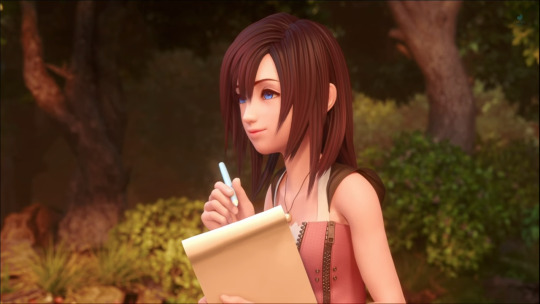
Here’s a general key for the analysis I’ll be doing this time:
JP: Japanese Story
This time, this part is just the story that I lifted directly from Kairi’s character file. Quotes of dialogue spanning the length of the series were used extensively in her story, and I included those as well.
EN: Official English Dialogue
In this case, I used the official English versions of all quoted dialogue for consistency, as it’s what’s familiar to people who have played the English version of the games.
TR: My Translation
I went for a poetic translation that sounds more natural in English this time. In instances where I thought the English dialogue differed enough from the English dialogue to be worth pointing out, I also provide a more literal translation of the Japanese dialogue.
Notes: things I found interesting, grammatical points, extra thoughts, etc.
First, I will do a break down of the story comparing the Japanese version with my translation, and then I will include a full transcript of my translation plus a full transcript of the Japanese script for Kairi’s character file for anyone who would prefer to read the translated version all at once or reference the original Japanese version all at once.
With that, let’s begin.
Kairi’s Story
Wherever You Are
JP: この世界のどこかにいるあなたへー
EN: Thinking of you, wherever you areー
TR: To the you somewhere in this worldー
Notes: These are the opening lines of Kairi’s letter to Sora in KH2. The Japanese version and the English version do differ somewhat, but the general meaning is the same. As her story in the character files focuses heavily on letters, beginning it with the opening line of her letter to Sora is very fitting.
JP: そんな文章から始まる手紙を出したのは、君のことを忘れている時だった。忘れているという表現が正しいのかもわからないけれど、私の中からーみんななの中から君は消えていた。
TR: That was how I began the letter I wrote to you when I’d forgotten you. Though maybe “forgotten” isn’t the right word. But you had disappeared from my heartーand from everyone else’s.
Notes: Kairi thinks back on the time she’d forgotten Sora and the letter she wrote him then, indicated by her use of the past tense. It should be noted here that there is no mention of hearts in the Japanese version; Kairi more literally says “From within meーand everyone elseーyou had disappeared.” That sounds awkward and clunky in English though, so I took some poetic liberties here to get the same general meaning across.
I’ll also note here that Kairi is not using Sora’s name here; she’s using the second person pronoun kimi “you” to refer to Sora, which is unusual for her, as she usually calls him by his name. In general, Japanese speakers tend to use pronouns a lot less than their English-speaking counterparts, as pronouns can often be understood from context and dropped in Japanese, or names are used when pronouns would be used in English.
So, then, why is Kairi using kimi?
Well, her use of kimi instead of Sora’s name could be referencing how she didn’t remember his name at the time, and thus she had to use kimi instead of his name. Kimi also tends to get used in poetry and songs to express familiarity and closeness, so that might also be why she’s using it here.
When she says Sora had disappeared, she uses you kimi on its own, and this is important. Using kimi on its own means she’s referencing Sora in general, his personality, his appearance, etc., and this is in contrast to something she says here soon.
JP: 「いつも私といた男の子たちのこと、覚えてる?」
EN: “Do you remember those boys who used to hang out with us?”
TR: “Do you remember those boys who were always with me?”
Notes: Not too much of a difference here, but the Japanese version does emphasize that Kairi was talking about the boys who were always with her, whereas the English version goes more for a more inclusive stance where she includes Selphie. Interesting to note too is that she asks if Selphie remembers otokonokotachi no koto. With the no koto part, she isn’t just asking if Selphie remembers Sora and Riku; she’s asking if she remembers anything about them, about the time they’ve spent together, the memories they’ve made, etc.
JP: セルフィに聞いたら、首を傾げてリクの名前を言った。君のことは覚えていなかった。でも私の中には君のことが残っていた。
TR: When I asked Selphie that question, she tilted her head and said Riku’s name. She’d forgotten about you. But all the memories we’d made together, what you mean to meーall of that lingered on inside my heart.
Notes: Again, we see that no koto construction again here, where Kairi says that “Selphie forgot you” kimi no koto ha oboeteinakatta, to contrast how something about Sora lingers on in Kairi’s heartーkimi no koto ga nokotteita. Of course, the “heart” part is an addition of my own, just because it sounds awkward in English to only say “you lingered/remained within me.”
Also, remember how I mentioned earlier that Kairi said that Sora disappeared from everyone’s hearts? There, she used kimi only, but here, to say something about Sora stuck with her, she uses kimi no koto. In the English translation, I added the “all the memories we’d made together, what you mean to meー” to try to capture this difference in meaning that no koto adds.
JP: 私は小さな瓶の中に手紙を入れた。
TR: I put the letter in a small bottle.
Notes: Kairi uses the pronoun watashi here, her usual pronoun of choice, to indicate she is the one putting the letter in the bottle
JP: 「なにそれ?」
瓶を海に浮かべた私に、セルフィが聞いた。
EN/TR: “What’s that?” Selphie asked me after I’d set the bottle afloat in the sea.
Notes: Pretty straightforward; this quote is referencing the scene where Selphie and Kairi are on the beach in KH2 and Kairi sets the bottle afloat.
JP: 「手紙ー昨日書いたの。思い出さない男の子にあてた。今は会えないけど、一途、またいつかってね。そしたら、私、その子との大切な約束を思い出した。この手紙が始まりなんだ。きっと」
EN: “A letter… I wrote it yesterday, to the boy I can’t remember. I said that no matter where he is, I’ll find him. One day. And when I stopped writing, I remembered we made a promise, something important. This letter is where it starts. I know it.”
TR: “A letterーI wrote it yesterday, to the boy I don’t remember. I said that I can’t see him now, but we’ll meet again someday, no matter what. And then, I remembered an important promise I (made) with that boy. This letter is the beginning. I’m sure of it.”
Notes: The Japanese and English versions of this dialogue are actually pretty similar to each other. Just a few quick grammar things: Kairi uses no at the end of her first sentence to indicate that she’s explaining something to Selphie and nanda at the end of the “this letter is the beginning” sentence to likewise show she’s giving information.
JP: 私は答えて波間に揺れる瓶を見つめる。あのとき私は思い出したんだ、君の名前を。
TR: That was the answer I gave her as I gazed at the bottle swaying between the waves. And that was when I remembered your name.
Notes: The Japanese version is more literally “I answered and gaze at the bottle swaying between the waves.” I’m not sure why Kairi switches to present tense here for the verb gaze, mitsumeru, but I thought I should note that she does, as it’s not reflected in my translation. With the part where she says “And that was when I remembered your name,” she really emphasizes the remembering by adding nda to explain, and then moves the object of the remembering, Sora’s name, to the right of the verb. Japanese word order is usually Subject, Object, Verb (SOV for short), but there is some flexibility with the word order (because Japanese marks case with its particles). Changing it up like this is done for emphasis or to make a point. In this case, it’s to really emphasize that what Kairi remembered is “your name,” AKA Sora’s name (though she doesn’t say it just yet to build up the anticipation in the next line).
JP: 最近はソ。ね、ソ、ラ!
EN: Starts with an “S.” Right, Sora?
TR: Starts with “So.” Right, “So, ra!”
Notes: The Japanese version of Kairi remembering Sora’s name is a little different from the English version, and that’s because the writing systems are also different. Whereas English uses an alphabet, Japanese has three main writing systems: 1) kanji, or Chinese characters, 2) hiragana, a syllabary with most symbols representing two combined sounds (though some symbols are for just one sound) that is mostly used for grammatical endings, and 3) katakana, another syllabary that represents the same sounds as hiragana, but is used for emphasis, animal names, character names, loanwoards, etc.
The Kingdom Hearts characters names are written in katakana, and Sora’s name is no exception. Thus, in the Japanese version of this line, Kairi says, “Starts with ‘So’” because the first katakana symbol you write Sora’s name with, ソ, includes both the sound “s” and the sound “o.” The English version changed this to fit the writing system of English, hence why Kairi says “Starts with an ‘S’” instead.
And the reason the line delivery of “Right, Sora?” in English sounds a little awkward is because in the Japanese version, Kairi emphasizes the two different katakana symbols in Sora’s name, ソ “so” and ラ “ra,” to reference Sora’s teasing earlier and to show that she remembers him. The English version kept this segmentation but changed the syllable focus to a focus on the letter “s,” maybe to match the lip flaps and timing of the scene? Not really sure, but that’s my guess.
JP: あれから時間が経って私は君にーソラに届かない手紙を書き続けていた。
TR: Time went on, and I kept writing to youーto you, Soraーletters that didn’t reach you.
Notes: This line is really lovely, and I struggled with how to capture the nuance going on here. At first, Kairi says she kept writing letters to “you,” then she corrects herself and says Sora’s name. She remembers his name now, and so she’s going to use it, like it’s something special and precious. If I had to spell it out, I might go for something like “I kept writing to youーto you, Sora, I want to use your name, now that I remember itーletters that didn’t reach you.” As it is, I decided to compromise as put it as “I kept writing to youーto you, Soraーletters that didn’t reach you” because I didn’t want to add in too much that wasn’t there, but I also wanted to emphasize how important Sora’s name is to her.
Just a quick grammatical thing, too: “letters that didn’t reach you” is what I have in the translation, but the “you” is not spelled out in the Japanese version because pronouns are implied. I decided to go with “you” here because I get the vibe that Kairi is addressing Sora throughout this letter and English needs a pronoun here.
JP: そして秘密の森の夕陽の見える丘、隣にはリアーアクセルがいた。君はまた長い旅の途中で、私も一緒に戦おうと修行をしているところだった。夕陽を見つめるアクセルの瞳はその眩しさにか、ちょっとだけうるんでいる気がした。
TR: One day, on the hill where you can see the Secret Forest’s sunset, LeaーI mean Axelーwas beside me. You were in the middle of another long journey, and I was in the middle of my training so we could fight together. As Axel gazed at the sunset, his eyes got a little moist, probably because of the glare.
Notes: The narration here turns to KH3 and sets the scene by locating it in the Secret Forest. Kairi quickly corrects herself when she says Lea, changing it to Axel to show that they’re friends now. She uses kimi to address Sora once more as she reflects back on this time. Notice too how Kairi picks up on the fact that Axel’s eyes are watering, though she’s not entirely sure why.
JP:「手紙か?」
EN/TR: “A letter?”
Notes: Pretty much the same in both languages.
JP: 「うん」
アクセルに私は頷く。私は毎日手紙を書いていた。
TR: “Yup,” I said as I nodded. I wrote letters every day.
Notes: Kairi uses a habitual version of the verb “write” combined with “every day” to emphasize that this was something she did consistently. Writing to Sora was a regular habit for her.
JP: 「ソラに?」
EN/TR: “To Sora?”
Notes: Pretty much the same in both languages.
JP: 「う〜ん、ソラに充てて書いているけど、渡さないから日記みたいなものかな」
EN: “Mmm, technically yes. But I won’t send it. It’s more for me.”
TR: “Mmmm, yes, I’m writing it for him, but I won’t give it to him, so it’s more like a diary.”
Notes: The English and Japanese versions are pretty similar here; main difference is that Kairi mentions that writing to Sora is like writing in a diary for her. She ends what she says with kana to indicate her words are speculative, like “Because I’m not giving this to Sora, I guess it’s more like a diary.”
JP: 私はそのとき島で君を忘れていた頃に書いた手紙のことを思い出した。
TR: I remembered the letter I wrote you back on the islands, when I’d forgotten you.
Notes: This letter of all letters sticks out in Kairi’s mind, and she references it again here. Again, she uses the construction no koto to refer not just to the letter itself, but all the memories and experiences she associates with it.
JP: 君のことをもう忘れたくなかったし、それに君がハートレスになったあのときーあのときみたいな気持ちにもう私なりたくなかった。
TR: I didn’t want to forget about you anymore, and that time you became a HeartlessーI didn’t want to feel that way ever again.
Notes: Kairi uses kimi no koto instead of just kimi to refer to her relationship and memories of Sora as a whole, much like she did earlier. She’s reflecting on some painful memories, the time she forgot Sora and the time he turned into a Heartless, and she’s emphasizing how she doesn’t want that to happen again.
JP: 「今度は私が助けなきゃー」
EN: “This time, I’ll protect you.”
TR: “This time, I’ll save youー”
Notes: This is referencing what Kairi said to Sora in KH1, when he was a Heartless and she promised to protect him this time. The verb she uses in the Japanese version means something more like “help, save,” so I wanted to mention that here. She also uses the nakya construction to indicate it’s something she has to do, that’s how strongly she feels about it.
JP: 私はハートレスになった君を抱きしめていた。私たちのまわりに別のハートレスが襲いかかる。でもあのとき、光と一緒にハートレスが消えて、君が戻ってきた。
TR: I was hugging you, after you’d turned into a Heartless. All around us were more Heartless, ready to swoop in and attack us. But then, as a light shone and made the Heartless disappear, you came back to me.
Notes: Kairi narrates what happened in KH1 here. She knew what the stakes were; she knew they were surrounded by Heartless, she knew Sora himself had turned into a Heartless, but she hugged him tightly anyway (the word for hug she uses indicates a close embrace). Then, miracle of miracles, the Heartless that were about to attack them disappeared, and Sora returned to her.
JP: 「カイリーありがとう」
EN/TR: “Kairi, thank you.”
Notes: She references how he thanked her here. Pretty much the same in both versions.
JP: そう言ってくれた君と一緒に走り出したよね。
TR: I was grateful to hear you say that, and together we started running.
Notes: Kairi uses tekureta after the verb here to indicate gratitude for what Sora said. In other words, she’s grateful that he’s grateful. Clearly, his thank you moved her deeply. After that, they started running together, presumably from Hollow Bastion.
JP: それから君と約束した。
TR: Then we made a promise.
Notes: Kairi references the promise they made after that, brining the story to the end of KH1.
JP:「俺はいつでもそばにいるよ。これからも、ずっと。必ず、絶対帰るから!」
EN: “I’m always with you too. I’ll come back to you, I promise!”
TR: “I’m always with you. Even now, we’ll be together. Because no matter what it takes, I’ll come back to you.”
Notes: These lines represent Sora’s promise to her. He uses yo after “I’m always with you” to emphasize his words. What follows is him reiterating in various ways that he means what he says, using zutto, “all along,” kanarazu “always/without fail,” zettai “absolutely.” He’s serious about this promise to her.
JP: 「約束だよ!」
EN: “I know you will!”
TR: “It’s a promise!”
Notes: In the Japanese version, she tells Sora that “it’s a promise,” which is a little different from the English version, but both get the same meaning across. I mention it here because this line is something Kairi will reference again at the end of this story.
JP: でもあの約束のあと、私たちは一度君を忘れてしまった。
TR: But after we made that promise, I forgot about you, and so did everyone else.
Notes: Kairi emphasizes here that despite their promise, “we” (“we” in the sense of her and everyone else, not “we” in the sense of her and Sora) forgot Sora. She expresses her regret over this happening by using teshimau.
JP: 私、今度は私がソラを助けなきゃ、ってずっと思っていた。いつも助けてもらってばかりだったから。だから待っているだけじゃダメだった。
TR: I kept thinking to myself, this time, I’ll protect you. You’d always protected me before, and waiting wasn’t good enough.
Notes: Kairi thought about how she wanted to protect Sora this time, referencing her earlier words to him (the Japanese version again is more like “I’ll save you, I have to,”). She uses zutto as well to show this was something she was thinking about for a while. She also talks about how Sora was the one protecting (more literally “saving”) her, and she uses temorau to show that she was receiving a favor by him doing so.
I will concede here that I’m assuming from context that she’s referring to Sora protecting her; she doesn’t spell it out explicitly, and it’s possible that she could just be referring to how other people were protecting her in general, but I think given the personal nature of the story and who it’s addressed to, Sora is a safe bet as to who she’s talking about.
She closes out this bit by what I’m guessing is meant to be a reference to her “waiting isn’t good enough” line in KH2.
JP: 小さな頃、秘密の場所で落書き、したよね。ソラが私を描いて、私がソラを描いた。君がいなくなったあと、私あの絵をもう一度見た。君が私の口にパオプの実を運ぶ落書きを書き加えてたって知ったんだ。
TR: When we were little, we made those drawings in the Secret Place, remember? You drew me, and I drew you. After you were gone, I looked at the drawing again. I found out that you’d drawn yourself sharing a paopu with me.
Notes: Here Kairi switches gears and thinks about the cave drawing. The first word she uses for the noun drawing, rakugaki, is more like “scribbles, scrawls, graffiti,” but I decided to translate it as “drawing” here. The second word she uses, when she mentions seeing the drawing again, is more properly “drawing,” e. The third time she uses “drawing,” it’s back to rakugaki, but I translated it as “drawn” so it sounds more natural in English.
In the last sentence, Kairi says something like “I knew you’d added to the drawing by drawing yourself holding up a paopu fruit to my mouth,” if I were to go for a more literal meaning. And once again, Kairi uses nda at the end of the sentence to give more of an explanation.
JP: 『その実を食べさせあったふたりは、必ず結ばれるーどんなに離れていても、いつも必ず』
EN: “If two people share one, their destinies become intertwined. They’ll remain a part of each other’s lives no matter what.”
TR: “After two people feed each other that fruit, they’ll always be joined togetherーeven if they’re separated, it doesn’t matter. They’ll always be together.”
Notes: Here, Kairi uses a different kind of quotes than she’s been using for normal character dialogue. It’s interesting to note that these words are the same words Riku told Sora when he teased him about sharing the paopu fruit with Kairi in KH1, down to using the same type of quotes. He was referencing the legend of the paopu fruit back in KH1, and Kairi is referencing it again here.
While the English version uses “share” to discuss the paopu fruit, the Japanese version is more literally “feed each other the paopu fruit,” which led to a little confusion when KH3 first came out and people wondered why two paopu fruits were involved. But the way Sora and Kairi shared the paopu fruit is consistent with the legend in Japanese and with the cave drawing.
Speaking of which, the word the legend has for “joined together” in Japanese, musubareru, can mean “tied together, fastened,” but it can also mean “to be wedded, joined in marriage.” No wonder Sora was so upset about the prospect of Riku sharing a paopu fruit with her instead, and no wonder he took sharing it with her so seriously in KH3.
JP: こうして今ふたりでデスティニーアイランドのパオプの木に並んで座って夕陽を見つめているといろんなことを思い出す。
EN: And now, the two of us are sitting side-by-side on the paopu tree back on Destiny Islands, gazing at the sunset as we think back on our memories.
Notes: Now Kairi’s story goes to the point in KH3 where she and Sora are sitting on the paopu tree. The story from here on out switches from past tense to present tense, indicating Kairi is recounting things that are happening now. The “think back on our memories” part is more like “think about various things,” but again, I took some poetic license here.
JP: 「リク、ひとりでなにしてるのかな?」
EN: “Hey, why’s Riku all alone?”
TR: “What’s Riku doing all by himself?”
Notes: This is Sora’s line as he wonders if Riku’s okay.
JP: 「でもひとりにさせてほしいって言って宝、そっとしてあげよう」
EN: “He said he needed time to himself. Let’s let him be.”
TR: “He said he wanted to be left alone, so let’s give him some space.”
Notes: Kairi has talked to Riku beforehand and knows what he wants. She suggests that they give him space as a favor to him by using teageyō.
JP: 砂浜に立っているリクを気にするソラに私はそう声をかける。私はパオプの実を手に取ると、ソラの口元に差し出した。
TR: Those are the words I say to Sora as he worries about Riku, who’s standing on the beach. Then I take a paopu fruit in my hand, and hold it out to Sora.
Notes: Kairi simply narrates what’s happening in the scene.
JP: 「はい!」
EN/TR: “Here.”
Notes: This is the moment when she offers him the paopu fruit.
JP: 「えっ?」
EN/TR: “Huh?”
Notes: She catches Sora by surprise, hence his reaction here.
JP: ソラがびっくりした顔をして私を見つめる。私は持っていたもうひとつのパオプの実をソラに渡した。
TR: Sora stares at me in surprise, and I hand him the other paopu fruit I was holding.
Notes: Notice how carefully Kairi pays attention to Sora’s body language.
JP: 「これからの戦いは今までと違うーもう離れ離れにならないように、おまじない」
EN: “Tomorrow’s fight will be our toughest yet. I want to be a part of your life no matter what. That’s all.”
TR: “The battle ahead (of us) is different from (all the ones we’ve fought) until now. This charm will make sure we won’t be separated (again).”
Notes: There’s a slight difference between the dialogue in the character files and the dialogue in the game. In the Japanese dialogue from the game, this is the dialogue:
これからの戦いは今までと違う もう離ればなれにならないように おまじない
But in the character files, the hanare repeats instead of going to banare. Just thought that was interesting.
Anyway, in the Japanese version, Kairi mentions that the paopu fruit is serving as a good luck charm, an omajinai. The English version’s lack of mentioning the charm at all may seem strange at first... but then I looked at the English version of the legend of the paopu fruit in more depth again, which includes the following line: “They’ll remain a part of each other’s lives no matter what.” The translators for the English version are actually referencing that line and thus the legend of the paopu fruit here. Just look at how similar Kairi’s wording is: “I want to be a part of your life no matter what.”
JP: ソラは急に真面目な顔になって私の手からパオプの実を受け取る。
TR: Sora’s face grows serious all of a sudden, and he takes the paopu from me.
Notes: Kairi once again pays attention to Sora’s body language and notes how serious he becomes. Again, if sharing a paopu fruit is like getting married, and not just that, binding your destiny to the person you share it with forever, no wonder he’s taking this so seriously. It’s a big deal to him, and he’s not treating it lightly.
JP: 「うん、でもカイリ��俺が守る」
EN: “Kairi, I’ll keep you safe.”
TR: “Okay. But Kairi, I’m going to keep you safe (lit. Kairi, I’ll protect).”
Notes: Sora is promising to keep Kairi safe here, which is a Big Deal in Japanese media (it even has its own trope, look up Declaration of Protection). It’s used most often by male protagonists to indicate their determination to keep their love interest safe, and often as a sign of how much they care and as an expression of their true feelings.
JP: 「ううん、私がソラを守るよ」
EN: “Let me keep you safe.”
TR: “No. I’ll keep you safe (lit. I’ll protect Sora).”
Notes: Kairi turns the Declaration of Protection on its head by saying no, she’ll be the one protecting Sora this time. She even uses the emphatic particle yo here to indicate her determination to keep Sora safe. It indicates certainty on the speaker’s part, a confidence and knowledge that she’s imparting to Sora. Long gone are the days where she would let him tell her to stay behind. She’s not asking permission here; she’s telling him what’s going to happen. She’ll protect him this time.
JP: 私たちはパオプの実を食べさせ合う。
TR: We share the paopu fruit.
Notes: Again, this is more literally “we feed each other the paopu fruit.”
JP: これはおまじないで、約束だった。
TR: This was a good luck charm, and a promise.
Notes: And it serves as a good luck charm for them, as well as a promise.
JP: ソラは私を守ってくれたけど、私はソラを守れたかな。だからソラはあきらめないで。消えないで。
TR: Sora protected me… but was I able to protect him? Don’t give up, Sora. Don’t disappear.
Notes: The story shifts again, with Kairi reflecting on what happened as a whole. Kairi uses tekureta to indicate she’s grateful for Sora’s protection, but then wonders to herself if she was able to protect him. Afterwards, she urges him not to give up and tells him not to disappear.
JP: だってソラはみんなの希望なんだから。
TR: Because you’re everyone’s hope.
Notes: She calls Sora everyone’s hope. Interestingly enough, during Sora’s final conversation with Xehanort, the camera very intentionally rests on Sora as Xehanort talks about the World’s hope. Sora being everyone’s hope is likely to be a plot point going forward, mark my words.
JP: 約束だよ。
TR: And that’s a promise.
Notes: Remember how I said earlier that Kairi’s “It’s a promise!”/“I know you will!” to Sora at the end of KH1 would be relevant again here at the end? She uses the same words in Japanese here to reiterate this new promise with Sora: “It’s a promise!”
Anyway, hope you enjoyed reading my translation and analysis! The translated version of the story is what’s next, and finally the original Japanese version will follow. A big, big thank to Kari for looking over the translations for me before I posted them, I really appreciate it! And thank you all for reading!
-------------------------------------------------------------------------------------------
English Version Only
Kairi’s Story
Wherever You Are
Thinking of you, wherever you areー
That was how I began the letter I wrote to you when I’d forgotten you. Though maybe “forgotten” isn’t the right word. But you had disappeared from my heartーand from everyone else’s.
“Do you remember those boys who used to hang out with us?”
When I asked Selphie that question, she tilted her head and said Riku’s name. She’d forgotten about you. But all the memories we’d made together, what you mean to meーall of that lingered on inside my heart.
I put the letter in a small bottle.
“What’s that?” Selphie asked me after I’d set the bottle afloat in the sea.
“A letter… I wrote it yesterday, to the boy I can’t remember. I said that no matter where he is, I’ll find him. One day. And when I stopped writing, I remembered we made a promise, something important. This letter is where it starts. I know it.”
That was the answer I gave her as I gazed at the bottle swaying between the waves. And that was when I remembered your name.
Starts with an “S.” Right, Sora?
Time went on, and I kept writing to youーto you, Soraーletters that didn’t reach you.
One day, on the hill where you can see the Secret Forest’s sunset, LeaーI mean Axelーwas beside me. You were in the middle of another long journey, and I was in the middle of my training so we could fight together. As Axel gazed at the sunset, his eyes got a little moist, probably because of the glare.
“A letter?”
“Yup,” I said as I nodded. I wrote letters every day.
“To Sora?”
“Mmm, technically yes. But I won’t send it. It’s more for me.”
I remembered the letter I wrote you back on the islands, when I’d forgotten you.
I didn’t want to forget about you anymore, and that time you became a HeartlessーI didn’t want to feel that way ever again.
“This time, I’ll protect you.”
I was hugging you, after you’d turned into a Heartless. All around us were more Heartless, ready to swoop in and attack us. But then, as a light shone and made the Heartless disappear, you came back to me.
“Kairi, thank you.”
I was grateful to hear you say that, and together we started running.
Then we made a promise.
”Kairi, remember what you said before? I’m always with you too. I’ll come back to you, I promise!”
“I know you will!”
But after we made that promise, I forgot about you, and so did everyone else.
I kept thinking to myself, this time, I’ll protect you. You’d always protected me before, and waiting wasn’t good enough.
When we were little, we made those drawings in the Secret Place, remember? You drew me, and I drew you. After you were gone, I looked at the drawing again. I found out that you’d drawn yourself sharing a paopu with me.
“If two people share one, their destinies become intertwined. They’ll remain a part of each other’s lives no matter what.”
And now, the two of us are sitting side-by-side on the paopu tree back on Destiny Islands, gazing at the sunset as we think back on our memories.
“Hey, why’s Riku all alone?”
“He said he needed time to himself. Let’s let him be.”
Those are the words I say to Sora as he worries about Riku, who’s standing on the beach. Then I take a paopu fruit in my hand, and hold it out to Sora.
“Here.”
“Huh?”
Sora stares at me in surprise, and I hand him the other paopu fruit I was holding.
“Tomorrow’s fight will be our toughest yet. I want to be a part of your life no matter what. That’s all.”
Sora’s face grows serious all of a sudden, and he takes the paopu from me.
“Kairi, I’ll keep you safe.”
“Let me keep you safe.”
We share the paopu fruit.
This was a good luck charm, and a promise.
Sora protected me… but was I able to protect him? Don’t give up, Sora. Don’t disappear.
Because you’re everyone’s hope.
And that’s a promise.
-------------------------------------------------------------------------------------------
Japanese Version Only
Kairi Story
Wherever You Are
この世界のどこかにいるあなたへー
そんな文章から始まる手紙を出したのは、君のことを忘れている時だった。忘れているという表現が正しいのかもわからないけれど、私の中からーみんななの中から君は消えていた。
「いつも私といた男の子たちのこと、覚えてる?」
セルフィに聞いたら、首を傾げてリクの名前を言った。君のことは覚えていなかった。でも私の中には君のことが残っていた。
私は小さな瓶の中に手紙を入れた。
「なにそれ?」
瓶を海に浮かべた私に、セルフィが聞いた。
「手紙ー昨日書いたの。思い出さない男の子にあてた。今は会えないけど、一途、またいつかってね。そしたら、私、その子との大切な約束を思い出した。この手紙が始まりなんだ。きっと」
私は答えて波間に揺れる瓶を見つめる。あのとき私は思い出したんだ、君の名前を。
最近はソ。ね、ソ、ラ!
あれから時間が経って私は君にーソラに届かない手紙を書き続けていた。
そして秘密の森の夕陽の見える丘、隣にはリアーアクセルがいた。君はまた長い旅の途中で、私も一緒に戦おうと修行をしているところだった。夕陽を見つめるアクセルの瞳はその眩しさにか、ちょっとだけうるんでいる気がした。
「手紙か?」
「うん」
アクセルに私は頷く。私は毎日手紙を書いていた。
「ソラに?」
「う〜ん、ソラに充てて書いているけど、渡さないから日記みたいなものかな」
私はそのとき島で君を忘れていた頃に書いた手紙のことを思い出した。
君のことをもう忘れたくなかったし、それに君がハートレスになったあのときーあのときみたいな気持ちにもう私なりたくなかった。
「今度は私が助けなきゃー」
私はハートレスになった君を抱きしめていた。私たちのまわりに別のハートレスが襲いかかる。でもあのとき、光と一緒にハートレスが消えて、君が戻ってきた。
「カイリーありがとう」
そう言ってくれた君と一緒に走り出したよね。
それから君と約束した。
「俺はいつでもそばにいるよ。これからも、ずっと。必ず、絶対帰るから!」
「約束だよ!」
でもあの約束のあと、私たちは一度君を忘れてしまった。
私、今度は私がソラを助けなきゃ、ってずっと思っていた。いつも助けてもらってばかりだったから。だから待っているだけじゃダメだった。
小さな頃、秘密の場所で落書き、したよね。ソラが私を描いて、私がソラを描いた。君がいなくなったあと、私あの絵をもう一度見た。君が私の口にパオプの実を運ぶ落書きを書き加えてたって知ったんだ。
『その実を食べさせあったふたりは、必ず結ばれるーどんなに離れていても、いつも必ず』
こうして今ふたりでデスティニーアイランドのパオプの木に並んで座って夕陽を見つめているといろんなことを思い出す。
「リク、ひとりでなにしてるのかな?」
「でもひとりにさせてほしいって言って宝、そっとしてあげよう」
砂浜に立っているリクを気にするソラに私はそう声をかける。私はパオプの実を手に取ると、ソラの口元に差し出した。
「はい!」
「えっ?」
ソラがびっくりした顔をして私を見つめる。私は持っていたもうひとつのパオプの実をソラに渡した。
「これからの戦いは今までと違うーもう離れ離れにならないように、おまじない」
ソラは急に真面目な顔になって私の手からパオプの実を受け取る。
「うん、でもカイリは俺が守る」
「ううん、私がソラを守るよ」
私たちはパオプの実を食べさせ合う。
これはおまじないで、約束だった。
ソラは私を守ってくれたけど、私はソラを守れたかな。だからソラはあきらめないで。消えないで。
だってソラはみんなの希望なんだから。
約束だよ。
#kairi#sokai#sora#kingdom hearts#kh translation#phoenix translates#kh character files#kh character file#kh3#kingdom hearts 3#phoenix downer#long post
249 notes
·
View notes